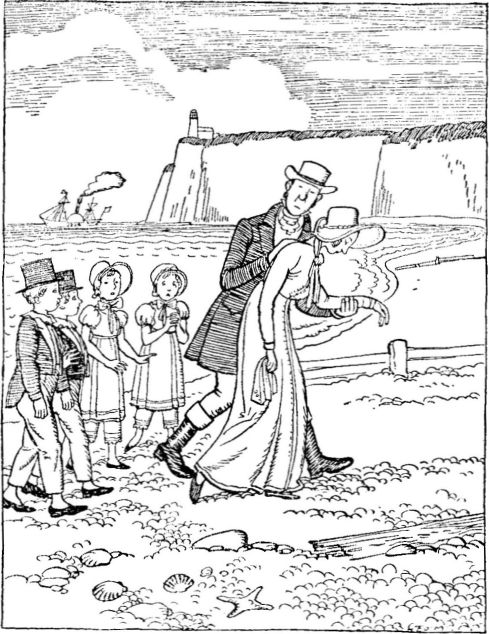
* A Distributed Proofreaders Canada eBook *
This eBook is made available at no cost and with very few restrictions. These restrictions apply only if (1) you make a change in the eBook (other than alteration for different display devices), or (2) you are making commercial use of the eBook. If either of these conditions applies, please check with an FP administrator before proceeding.
This work is in the Canadian public domain, but may be under copyright in some countries. If you live outside Canada, check your country's copyright laws. If the book is under copyright in your country, do not download or redistribute this file.
Title: The Birdikin Family
Date of first publication: 1932
Author: Archibald Marshall
Date first posted: Sep. 12, 2013
Date last updated: Sep. 12, 2013
Faded Page eBook #20101007
This eBook was produced by: Marcia Brooks, Ross Cooling, Mark Akrigg & the online Distributed Proofreaders Canada team at http://www.pgdpcanada.net


Thanks are due to the Proprietors of Punch for their courtesy in allowing these stories and many of the illustrations to be published in this volume.
| CHAP. | PAGE | |
| I. | A Walk with Papa | 1 |
| II. | The Results of Disobedience | 7 |
| III. | The Poacher | 13 |
| IV. | A Visit to the Sea | 20 |
| V. | The Birthday Gift | 27 |
| VI. | The Birthday | 33 |
| VII. | An Afternoon's Play | 39 |
| VIII. | A Talk with Mama | 46 |
| IX. | An Errand of Mercy | 53 |
| X. | A Game of Red Indians | 60 |
| XI. | An Unfortunate Encounter | 66 |
| XII. | An Amateur Conjurer | 72 |
| XIII. | Miss Smith Gives Notice | 79 |
| XIV. | Miss Smith Remains | 86 |
| XV. | The Lost Bracelet | 92 |
| XVI. | Fanny Runs Away | 99 |
| XVII. | The Bishop's Visit | 105 |
| XVIII. | The New Rector | 111 |
| XIX. | A Hunt Dinner | 118 |
| XX. | A Misunderstanding | 125 |
| XXI. | A Lawn Meet | 131 |
| XXII. | An Engagement | 137 |
| XXIII. | A Marriage | 143 |
| XXIV. | Farewell to the Birdikins | 149 |
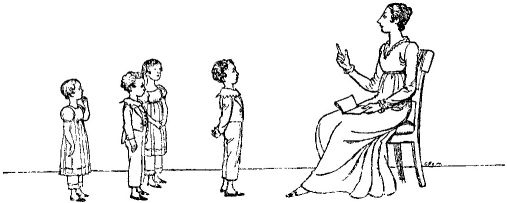
'Come, children,' said Mrs. Birdikin, entering the breakfast-parlour where the four young Birdikins were plying their tasks under the supervision of Miss Smith, 'your good Papa is now able to resume walking exercise and wishes that you should all accompany him on this fine morning, if Miss Smith will kindly consent to release you half an hour earlier than customary.'
Miss Smith, who occupied the position of governess at Byron Grove, the country seat of Mr. Birdikin, was a woman of decent but not lofty parentage, whom her employers treated almost as they would have done if her birth had been equal to her integrity. This toleration, which so well became persons of a superior station, was exhibited on this occasion by Mrs. Birdikin's asking permission of Miss Smith to cut short the hours devoted to study instead of issuing a command. Miss Smith was deeply conscious of the condescension thus displayed and replied in a respectful tone, 'Indeed, ma'am, the advantages that my little charges will gain from the converse of my esteemed employer, while engaging in the healthful exercise of perambulation, would be beyond my powers to impart'.
Mrs. Birdikin inclined her head in token of her appreciation of the propriety of Miss Smith's utterance and said, 'Then go at once to your rooms, children, and prepare yourselves for the treat in store for you'.
The four children trooped obediently out of the room, the two boys, Charles and Henry, politely making way for their sisters, Fanny and Clara; for, although their superiors in age, they had been taught to give place to the weaker sex, and invariably did so when either of their parents were by.
It did not take the little girls long to array themselves in their bonnets and tippets, nor their brothers to prepare themselves in a suitable manner for the excursion. When they were assembled in the hall Mr. Birdikin made his appearance from the library. John, the footman, who was in attendance, handed him his hat, gloves, and walking-cane, and the condescending word of thanks with which he was rewarded sent him back to the domestic quarters of the house in a thankful spirit at having taken service with so excellent a master, who seldom raised his hand in anger against a menial and had never been known to enforce his instructions by an oath. Small wonder then that Mr. Birdikin received willing service from those in his employ, who were assured of a comfortable home and such moral instruction as was suited to those of an inferior order, unless some serious delinquency should bring about their dismissal or illness render them no longer capable of performing the duties of their station.
It was Mr. Birdikin's custom in these delightful walks with his children to question them upon the course of study they were pursuing with Miss Smith and to distribute commendation or censure according as they acquitted themselves well or ill in his examination. But he was well aware that allowance must be made for the natural exuberance of young children, and that you could not expect old heads to grow on young shoulders. He was thus always ready to listen to their remarks as long as they were addressed to him in a proper and respectful manner.
'I am rejoiced, dear Papa,' said Charles, a bright-faced lad of some eleven summers, whose natural high spirits caused him to leap and caper as they walked down the handsome carriage-drive, 'that you are now able to use both your feet. At the same time I should prefer to keep one of my own feet on a rest rather than engage in uncongenial occupations.'
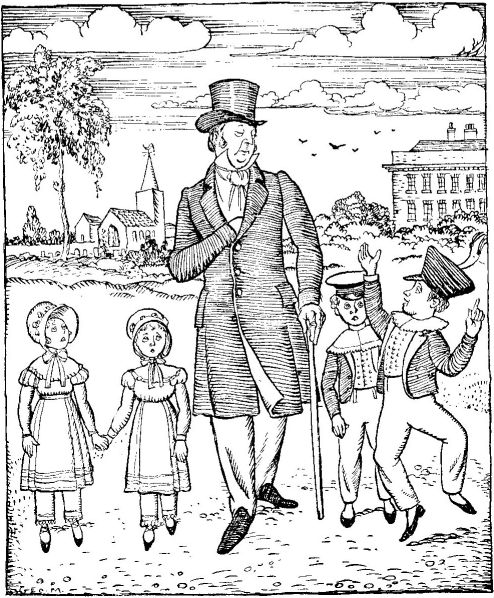
'So would not I,' said Henry, whose more thoughtful disposition seemed to mark him out even at that early age for the clerical profession, in which his maternal uncle held Episcopal office and had preferments of considerable emolument in his bestowal, to one of which Henry might well look forward. 'To my mind a life of benevolent activity is preferable to one of idleness, and I would invite our dear Papa to judge between us in this matter.'
'I have no hesitation, my dear Henry, in pronouncing in your favour,' said Mr. Birdikin, 'and if your brother will consent to use the two members of which he has so lightly expressed himself anxious to pretermit the use of one, instead of bounding about in what I can only refer to as a caprine manner, I will endeavour——'
Here he was interrupted by Fanny, a child of a somewhat sullen and intractable disposition, who inquired, 'Is it true, Papa, that an attack of gout is brought on by overindulgence in the pleasures of the table?'
'And pray where, Fanny,' inquired Mr. Birdikin in his turn, 'did you acquire an idea so unsuited to the intelligence of one of your years?'
His countenance displayed signs which Clara, who was known in the family as the Little Peacemaker, interpreted as indicative of annoyance. Anxious that the harmony of the expedition should be preserved, she hastened to say, 'My sister inquired of Dr. Affable the cause of your ailment, dear Papa, and he informed her that it was sometimes brought on by partaking to an excessive extent of port wine; but——'
Here she was interrupted by Charles who remarked, 'When I grow to manhood I shall drink three bottles of port wine with my dinner every day.'
'So shall not I,' interpolated Henry, 'for do we not read that wine is a mocker, strong drink is raging?'
This apposite remark caused Mr. Birdikin's brow to relax. 'I am glad,' he said, 'that at least one of my children has learnt to express himself with propriety on a question somewhat beyond childish intelligence. Our good Dr. Affable has no doubt had experience of ill-regulated lives where excess has led to bodily ailments. In my case the malady with which I have lately been visited is the result of a possibly over-anxious regard to the performance of my duties and a consequent disregard for my own health.
'But, come, children, let not our walk be wasted in idle discourse. You have the advantage of the instructions of a preceptress whose lack of breeding must not blind you to the admirable use she has made of her understanding. You, Charles, subdue your spirits to a reasonable degree of quietude and inform me to what subject of study your attention was directed this morning.'
Charles, thus admonished, put a curb upon his tendency to leap and curvet and replied with propriety that he and his brother and sisters had been instructed in the use of the Globes. This gave Mr. Birdikin the opportunity of putting various questions suited to the intelligence of his young hearers and administering correction and reproof in such a way that the limits of the walk were attained with profit to all and enjoyment to some.
Fanny, however, whose answers to her father's questions had betrayed a lack of application to the subject in hand that had brought her within measurable degree of a threat of punishment, did not show that spirit of gratitude for the condescension of a kind parent in devoting himself to the instruction and entertainment of his children that could have been wished. As she and Clara were removing their outer garments upon their return from the expedition Clara said to her, 'Are we not fortunate, sister, in the possession of a Papa who, with a mind so well stocked with knowledge, is anxious to put it at the disposal of his children?'
'I apprehend,' replied Fanny, 'that my Papa does not know so much as he thinks he does.'
'Disrespectful child,' ejaculated Clara, the blush of indignation mantling her cheek, 'to speak thus of a kind and indulgent parent! Fie! For shame!'
'Fie to you!' replied the unrepentant Fanny.
And there we must leave our young friends for the present.
The parish in which Byron Grove, Mr. Birdikin's country seat, was situated, was served by a curate of the name of Guff, who was possessed of a considerable family of young children. It speaks well for the unworldliness and condescending kindness of Mr. Birdikin that he should not object to the young Guffs consorting at times with his own children, upon whom he impressed it that poverty was no crime where conduct was satisfactory, and that on no account were the curate's children to be twitted or quizzed on account of their inferiority.
One fine afternoon, two of the Guff children, Thomas and Lucy, were invited to Byron Grove to play with Charles, Henry, Clara, and Fanny. It was usual for Miss Smith to be with the children when they thus disported themselves, but that afternoon Mrs. Birdikin had requested of the governess that she should go through her linen-cupboard with her, and Miss Smith, sensible of the compliment, had put her services at the disposal of her kind employer, adjuring her young charges not to lead their visitors into mischief nor be drawn into the same themselves.
'Well, what shall we do?' cried Charles brightly as the six children found themselves in the handsome grounds surrounding the stately residence. 'My own preference is for a game of tag, if our young guests have no better suggestion to offer.'
'I opine,' said Henry, 'that in view of the sacred character of their parents' calling Thomas and Lucy would prefer a less frivolous occupation. Can we not play at visiting the sick poor? The strawberries are now in season, and those of us who are deputed to bring delicacies to the sufferers can first visit the kitchen-garden.'
All the children clapped their hands at this, except Clara, who said, 'Are you not aware, brother, that our parents have forbidden us to regale ourselves with fruit from the garden except under the supervision of Miss Smith?'
'It would ill become me,' replied Henry, 'to counsel disobedience to a direct command of our parents; but I apprehend that the prohibition would not apply to a diversion of which they could not but approve. You, Thomas, shall take the part of the sick labourer, if you are willing, in what is only a game, to divest yourself of that degree of gentility to which you can lay claim. You, Fanny, shall be the labourer's wife and Clara their daughter. Charles and Lucy will represent the Squire and his lady, and I will content myself with playing the part of the apothecary summoned to attend the sufferer.'
'Will the apothecary himself partake of the delicacies to be conveyed to the sick poor?' inquired Fanny. But Henry made no reply to this question.
The children then devoted themselves to adapting one of the summer-houses, of which there were several in the spacious grounds of Byron Grove, to the simulacrum of a sick-chamber. Miss Smith, relieved for a few minutes from her attendance upon Mrs. Birdikin, who was accustomed to partake of a glass of sherry wine and some light and delicately prepared viands at this time of the afternoon, now came into the garden, and, finding the six children so innocently employed, retired with a word of commendation to her chamber until it should be time to attend again upon Mrs. Birdikin. Her frame was not robust, and her anxiety to save her kind employer undue exertion had led her to take upon herself the heavier duties of the afternoon's occupation, while Mrs. Birdikin sat upon a low chair and directed her. But, though her body was aching, her heart was full of thankfulness at the consideration with which she was treated in this pious and superior family, and, after lying for a few minutes prone upon her bed, she returned to take up the part assigned to her, little thinking of what was going on among those whom she would otherwise have been supervising.
No sooner had the summer-house been arranged for the scene of the little drama so happily projected, and Thomas, Fanny, and Clara left there to prepare for their parts, than Fanny said, 'Let us hide from them.' She ran out of the arbour, followed by Thomas, but Clara remained there, being unwilling, even in play, to depart from the strict rectitude enjoined upon the Birdikin children from their earliest years.
No high degree of censure, however, would have been merited for what would have been no more than an additional mystification introduced into a game of make-believe, but Fanny's next step was a definite invitation to her young guest and companion to an enterprise by no means innocent. This was to climb on to the roof of the arbour, a proceeding involving not only indelicacy on the part of a female, however young, but danger to life and limb for both of them.
It may be urged that Thomas, being the son of a clergyman, who, although not beneficed, was yet the official guardian of parochial behaviour, should have protested. It would have been well if he had reflected for a moment that what in Fanny might have been a venial fault, in him, admitted so generously to the companionship of children vastly superior to himself in station, could only be looked upon as presumption. Alas! the careless boy gave way instantly to the temptation, and even assisted Fanny to clamber up to the roof of the arbour, where they ensconced themselves, concealed by a yew which overhung it, and waited for the return of their playmates.
In the meantime the other children had repaired to the strawberry-beds with their baskets, which they piled up with the luscious fruit, filling their mouths at the same time to an extent far in excess of the requirements of the little drama they were enacting.
They then returned to the summer-house, now supposed to be the homely cot of a tiller of the soil. There they were met by Clara, who had in vain tried to persuade Thomas and Fanny to descend from their hiding-place. She at once disclosed their situation, to the intense annoyance of Fanny, whose ruse was thus discovered. 'Tell-tale!' she cried, and before the word was well out of her lips she had slipped from the precarious slope of the roof and fallen upon Henry, whom she bore to the ground, upsetting the basket he was carrying and ruining her freshly-washed and ironed cotton frock with the juicy fruit, upon which she subsided in a sitting posture.
Fanny's fall had been broken by her collision with her brother. Not so that of Thomas, whom her sudden movement had also dislodged. He fell sheer to the ground, and, instead of rising at once to take part in the angry dispute now proceeding amongst the rest, he lay there groaning.
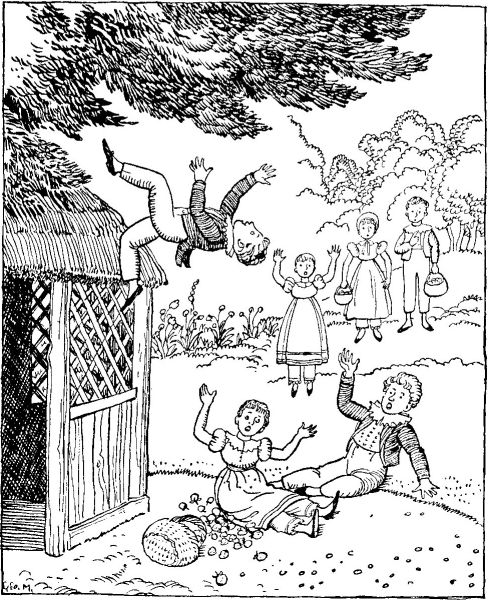
In response to the cries of the frightened children Miss Smith came running out, followed by John the footman, who lifted Thomas in his arms and bore him into the house, where it was discovered that his discreditable prank had resulted in a broken leg. It was not until Dr. Affable had been sent for and put the limb into splints that Thomas was sent home in Mr. Birdikin's carriage with a note to the curate begging that he should not be further punished for his delinquency and stating that Mr. Birdikin would himself defray the cost of the requisite medical attendance in view of Mr. Guff's straitened circumstances.
This large-hearted generosity towards the curate's child was all the more meritorious since Mr. Birdikin judged it necessary to take a severe view of the misconduct of his own children. As he had no mind to differentiate the degrees of blame attached to each, all were soundly whipped and sent supperless to bed. The tears of all indicated that repentance had come home to them; but Fanny, who had been chiefly responsible for the misconduct that had had such serious results, confided to her sister that her only regret was that she had not eaten her share of the strawberries before sitting on them.
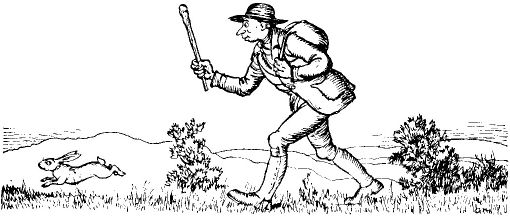
Mr. Birdikin was not himself an adept with the fowling-piece. He saw nothing wrong in the pursuit of fur and feather, judging that birds and animals suitable for human consumption were intended by an all-wise Providence to appear roasted or boiled on the tables of those whose worldly circumstances entitled them to partake of the more costly viands. But some slight obliquity of vision, not otherwise noticeable, made him an indifferent marksman, and a disinclination for the more arduous forms of bodily exercise, resulting in an increase of girth about the midriff, had caused him some years before to relinquish the pursuit of a sport for which he felt himself unfitted. He had at the same time given up preserving feathered game in the woods and fields of his demesne, but members of the coney tribe abounded there, and birds from the coverts of his neighbours, the Earl of Bellacre and Captain Rouseabout, not infrequently transferred themselves to those of Mr. Birdikin.
One of his numerous outdoor staff was deputed to keep down the vermin and to supply his master's table with the toothsome trophies of his gun or his traps, and Mr. Birdikin was wont to prefer the modest boast that his requirements in the way of game when in season were as fully met as those of his neighbours, and at a tithe of the expense to which they were put.
One morning this man Shotter came to his master and informed him that a cottager of the name of Onion had regaled his family the day before with a rabbit, which had no doubt been illicitly snared on Mr. Birdikin's property. It was not the first time that the savoury smell of this rodent had been detected coming from Onion's dwelling, and Shotter, devoted to his master's interests, respectfully suggested that it was time that a stop should be put to his depredations.
Mr. Birdikin judged it his duty to pursue the matter. Onion had been employed in a boot and shoe factory in the neighbouring town, and inhabited a hovel on the outskirts of Mr. Birdikin's estate, from which he could not be dislodged, as it was his own freehold. He was an unsatisfactory character, never attended the ministrations of Mr. Guff, the excellent curate, and had been known to utter subversive sentiments on the subject of landowners in general and Mr. Birdikin in particular over his potations in the 'Pig and Whistle'. In spite of all this, Mrs. Birdikin, a true Lady Bountiful, had included this man's wife and children in the visits she paid to the cottagers on her husband's estate, and since Onion had lost his employment she had given instructions that the scraps from her own table should be supplied to his wife, if called for, and only that morning had picked out a suitable tract on the sin of gluttony to be added to the eleemosynary gift. Small wonder then that Mr. Birdikin's gorge was aroused at the ingratitude and dishonesty brought to his notice. As a magistrate of the county he sent instructions to a police constable to take Onion into custody, and before night fell he was safely lodged in gaol.
So far the dictates of right and justice had been followed, but Mr. Birdikin's large-minded humanity forbade his including the innocent victims of Onion's turpitude in the punishment he designed for the perpetrator himself. The next morning, in his daily walk with his children, he directed their footsteps to Onion's dwelling, and on the way thither expounded in a manner adapted to their immature understanding the iniquity which he had felt himself bound to punish.
'You will see for yourselves,' he said in conclusion, 'the misery which the turpitude of a husband and father has brought on a comparatively innocent family. The wife is culpable in so far as she cooked the stolen food and the children are to be blamed for having consumed it; but we whose table is bountifully spread may make allowances for those whose food supplies are intermittent, and I do not propose to take further notice in their case of an offence of which I feel bound to exact the full penalty in his.'
'If I were hungry,' said Charles, 'I should eat all the rabbits I could find, and the pheasants too.'
Mr. Birdikin's brow darkened at the thoughtless disposition thus displayed by his elder son, but before he could express his displeasure Henry, who was more responsive to the training he was endeavouring to impart to his children, said, 'So should not I. Our father has continually impressed upon us that the rights of property are sacred, and I would sooner starve than lay a finger on what was not mine'.
Mr. Birdikin was about to commend the propriety of this utterance, but before he could do so Fanny broke in with the question, 'Then why did you gobble up all the comfits that our aunt brought for us yesterday?'
Clara, the Little Peacemaker, hastened to intervene. 'My brother thought they had been a present for himself,' she said, 'and as he was under that misapprehension I willingly resigned to him my share of the dainties.'
'After he had filled his belly with them,' said Fanny, whose propensity to pick up coarse expressions from the stable-lads and others of the lower orders employed in her father's stylish establishment caused her excellent parents much concern.
The rebuke administered by her father withdrew attention from Henry's unfortunate mistake, and by the time it was ended they had arrived at the lowly cot which was the objective of their excursion. Here they were met by Mrs. Onion, who ran out to her benefactor, with half a dozen ragged children hanging on to her skirts, and implored him to have pity upon an innocent man. 'Indeed, your Honour,' said she in her rustic jargon, 'the rabbit were not snared by my Jarge. It come into the garden and was nibbling of our cabbages when it fell down dead, and all we done was to skin it and put it in the pot.'
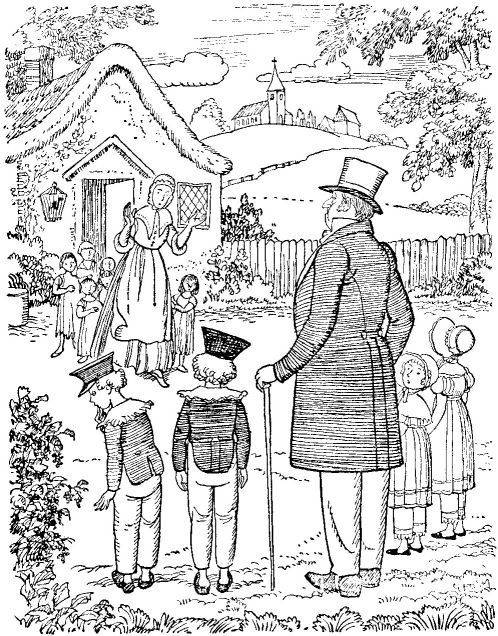
Mr. Birdikin was not unmoved by this address, and was proceeding to inquire of her the manner of the rabbit's decease, not being without the suspicion that its life had been ended by violence, when her respectful demeanour suddenly changed. She pointed her finger at Henry and shrieked out, 'Who's the thief now? Get out of my sight you old sarpent, and take your greedy brats with you. I'll have the law on you now. Get out!'
The cause of this deplorable outburst, so little to be expected from one who owed so much to Mr. Birdikin's bounty, was that Henry had picked a bunch of currants from a neighbouring bush and was eating them when the woman's eye fell upon him.
The full weight of Mr. Birdikin's displeasure at her outrageous speech and demeanour would have fallen upon her, but she had retired into her hovel and banged the door in his face. He judged it wiser to remove himself from the scene, all the more so as she thrust her head from the window and cried out that she suspected him of hanging about to 'pinch', as she vulgarly expressed it, the family plate, and adjured him in the most indecorous language to take himself off, and his 'spawn' with him.
'Come, children,' he said, with the dignity that he maintained under the most trying circumstances, 'let us begone. You, Henry, who have brought upon us this indecent exposure of low-breeding, shall yourself gather the twigs which I will bind into a birch for your correction. As for this no-doubt demented woman, I command you all to forget her improprieties. Those of you who disobey me, whether male or female, shall feel the weight of my hand.'
For the children the episode was ended by this command and by Henry's chastisement. For Mr. Birdikin, however, the annoyance and injury to which he had been subjected were not yet over. His upright and perhaps over-scrupulous way of conducting himself was not to the mind of his neighbour, Captain Rouseabout, who was addicted to cockfighting and other low sports, and so far forgot himself as habitually to use unseemly language in Mr. Birdikin's presence for the sake of shocking his sense of propriety. Though totally unfitted for judicial office, except in his abhorrence of poaching and poachers, he sat on the Bench as a magistrate, and when the charge was preferred against Onion had the audacity to say that it was Mr. Birdikin who should have been brought before them for shooting and trapping game reared by his neighbours. The woman Onion's counter-accusation of trespass and fruit-stealing caused Captain Rouseabout to burst into a loud and rude guffaw. She was not permitted to prefer a charge, but it was considered by Mr. Birdikin's fellow magistrates that it was a case of tit for tat, and the charge against the poacher was dismissed.
Mr. Birdikin returned home, and regained from the respect and deference of those dependent upon him the serenity which had been somewhat shaken by the annoyance he had undergone at the hands of Captain Rouseabout. In the spacious and opulent surroundings of Byron Grove he felt himself indeed a king among men, and was upheld by the conviction that such a man as his neighbour must inevitably, be it sooner or later, come to a shameful and dishonoured end.
Byron Grove, Mr. Birdikin's country seat, was situate six miles from the seaside town of X, to which, when temperature and weather conditions were favourable, the Birdikin children were sometimes taken for immersion in the ocean, their parents considering that, if due precautions were taken against the dangers of sea-bathing, its benefits could not but add to their health as well as to their enjoyment.
One summer morning, when Mr. Birdikin had satisfied himself by examination of the weather-glass that no immediate change was to be anticipated in the quiescent state of the elements, the four children were sent, under the charge of their instructress, Miss Smith, to spend the day at X. The programme arranged for them, with the thoughtful foresight which Mr. and Mrs. Birdikin exercised in all the details of family life, of which they were such exemplary exponents, was that they were to be driven to the seashore, and while Bodger, the coachman, was putting up his horses the children were to perambulate the sands and the rocks and, under the supervision of Miss Smith, were to investigate such denizens of the deep as star-fishes, winkles, jelly-fish, limpets and the like as came within the range of observation, but on no account, at this stage of the proceedings, were they to get their feet wet or venture beyond the control of their governess.
Upon the return of Bodger, a respectable family man who could be trusted to act responsibly in a case of emergency, Miss Smith was instructed to engage one of the larger bathing-machines, in which the whole party would disrobe themselves, with the exception of Bodger, who would keep watch upon the beach. This accomplished, the two boys and Miss Smith would plunge into the briny element, and, upon the expiry of a quarter of an hour, to be signalled by Bodger, who would stand on the marge of the ocean with his timepiece in his hand, the two girls would take the place of their brothers, Miss Smith being instructed on no account to let go of the hands of her young pupils nor to venture beyond her own middle.
All went according to plan until Bodger signalled, by the springing of a watchman's rattle, that the time allowed for Charles and Henry was at an end. Miss Smith was gratified at the complaisant spirit shown by the boys in returning to the machine, but no sooner had she led out Clara and Fanny than Charles, instead of rubbing himself briskly with a rough towel, as he had been instructed, leapt again into the water and with gleeful shouts began to splash his sisters and the governess. In vain did Miss Smith exhort him to obedience, in vain did Bodger threaten to wade into the water himself and chastise him. The insubordinate lad continued his rough play, and Fanny, always inclined to be refractory when encouraged by Charles, who had so often been adjured to show a good example to his younger brother and sisters, entered incontinently into the boisterous and unmannerly sport, and wrenched her hand away from Miss Smith's in order that she might the better strike the water into her brother's face.
At that moment a wave advancing towards the shore dislodged her foothold, and upon its return carried her some yards away from Miss Smith. The governess, anxious to seize hold of Charles, did not notice this catastrophe for the moment, and but for the presence of mind of the bathing-woman in attendance on the machines, who caught hold of Fanny and jerked her to her feet again, one of those tragedies might have been enacted against which Mr. Birdikin had enjoined all the precautions that were humanly possible. Fanny herself made light of the incident and refused to return to the machine until her appointed time in the water was over. Miss Smith put her and Clara into the charge of the bathing-woman and carried the struggling Charles back to the machine, where she carefully dried him, and did the same for Clara and Fanny before she attended to her own toilet, after which the machine was drawn out of the water and the bathing-party regained the safety of the shore, Miss Smith in a spirit of thankfulness that the peril brought about by Charles's thoughtless prank had mercifully been averted.
Miss Smith, however, had a frame far from robust, and the anxiety to which she had been subjected, together with the chilling effect of standing in her wet but decent serge bathing-dress while she saw to the welfare of her young charges, brought on a fit of shivering and a numbness of the extremities which caused Bodger, who had been trained by his wife to take observation of female ailments, some alarm. Followed by the frightened children he supported Miss Smith up the beach and led her to the first shelter available, which happened to be an establishment devoted to the exhibition and sale of ironmongery, where he demanded succour, suggesting that it should include the administration of a measure of French brandy.
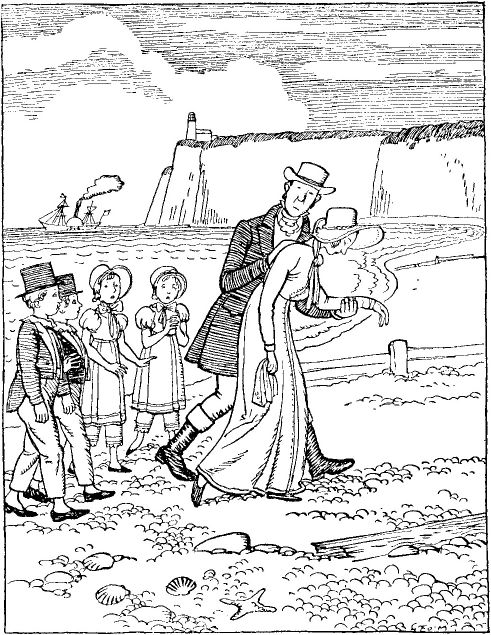
It has already been said that Miss Smith's birth was not equal to her scholastic attainments. Of this Mr. Birdikin had been aware when he had engaged her for the responsible task of administering, under his own direction, the education of his children. What she had omitted, however, to disclose to him was that in this very town of X she had relatives who were by no means of a quality suitable for notice by a man of Mr. Birdikin's superior standing. It was to these relatives that the inscrutable leadings of chance had directed Bodger's unwitting footsteps. Miss Smith's own mother's sister, Mrs. Clott, received her and gave her the willing service and relief dictated by the promptings not only of charity but of consanguinity. A kind heart is not, as some would aver, the peculiar property of those of high or even of medium birth. This good woman's first preoccupation was to administer hot toddy to her relative and put her to bed in a small but decently furnished chamber. Her next was to provide entertainment for the young children who were for the time being in her charge, the coachman, Bodger, announcing that the shock he had undergone necessitated his repairing to a neighbouring hostelry where he could obtain the refreshment required by his condition. So well did Mrs. Clott accomplish her task that when, some hours later, Miss Smith was sufficiently recovered and Bodger was summoned from the 'Mariners' Rest' to drive her and her charges home again, all four children declared that they had never enjoyed themselves better, and took leave of their kind hostess with expressions of goodwill which, coming from the offspring of a man of Mr. Birdikin's superior station, must have caused her considerable gratification.
The adventures and alarms of the day were not yet quite over, for Bodger had not entirely recovered from the agitation that Miss Smith's indisposition had caused him, and showed less than his usual skill on the driving-seat, the carriage deviating from side to side of the road and narrowly escaping reversal in a ditch. Home was reached, however, without actual mishap, and Mr. and Mrs. Birdikin were put in possession of the details of the day's happenings.
It may be imagined that Miss Smith was far from being at her ease over the accident that had led to the children being received in the dwelling of her aunt, for Mr. Birdikin, taking into account the inferiority of her origin, had impressed upon her that it was her special duty to preserve her little charges from contact with anything low. He was inclined, however, to judge her part in the affair leniently, only remarking that had he been aware that she had relatives engaged in retail trade at so short a distance from Byron Grove as the town of X, he might have thought the risk of engaging her too great, and that she would do well to consider the indisposition she had herself experienced as a punishment for her lack of frankness. He could not, of course, countenance any further personal communication with Mrs. Clott, but, in consideration of the seemly way in which she had dealt with the situation, he intimated his intention of transferring his custom from the ironmonger whom he had hitherto honoured with his patronage to Mr. Clott. Thus the dictates of propriety and urbanity were alike honoured, and Miss Smith retired from the interview with a deep sense of the tolerance and benevolence of her employer.
Mr. Birdikin's displeasure with Charles and Fanny for their unprincipled conduct was expressed by a few sharp strokes of the rod for the boy and of the bare hand for the girl. But Fanny's punishment, alas, did not incline her to that compliance of the heart which she had promised with the lips. Her experience of the more obscure ranks of society, by which her excellent parent was above all anxious that his children should not be contaminated, had made no deeper impression upon the heedless child than to cause her to confide to her sister that when she attained maturity she should ally herself in wedlock to an ironmonger and live at the seaside.
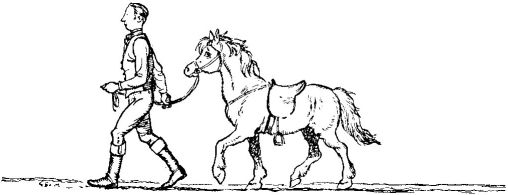
The birthdays of the young Birdikins were always made occasions of innocent enjoyment, and high were the anticipations of pleasure with which all four children awoke on the morning upon which Charles entered upon his thirteenth year. No lessons would be required of them, and Miss Smith would be released altogether from her usual attendance upon her young charges, being set free for the soothing occupation of darning their stockings and seeing to the buttons on their underwear, and at full liberty to use what leisure remained over for the pursuance of her own pleasure, so long as it was such as to meet with the approval of her employers.
'Well, my dear Charles,' said Mr. Birdikin when he had received his son's morning duty and congratulated him upon the attainment of another step in life's journey, 'as you have now reached the ripe age of twelve I conjecture that you will scarcely expect to receive the commemorative gifts with which such an occasion as we are now celebrating has been marked in your more immature years.'
Charles's face fell, and Mrs. Birdikin made haste to say, 'Your papa's remark, Charles, is made in a spirit of whimsicality. Pray accept from your mother this volume of virgin paper, bound, as you see, in blue morocco with your initials stamped upon it in gold, in which you are invited to set down such moral reflections as occur to you from time to time, or such as you may derive from your day's reading.'
To this handsome and timely gift were added those of Charles's brother and sisters, prepared under the advice of their parents and the supervision of Miss Smith. These were a volume of sermons by their kinsman, the Lord Bishop of P——chester, from Henry, a warm muffler knitted by her own hand from Clara, and from Fanny the Golden Rule, illuminated in colour by herself and suitably framed for suspension over her brother's bed.
When the expressions of pleasure drawn from the delighted lad over these tokens of fraternal affection had subsided, Mr. Birdikin said, still in that vein of drollery with which he was accustomed to temper the authority of a parent at such times of relaxation, 'For the enjoyment of your father's gift you must wait, my dear Charles, until the claims of appetite have been satisfied. Its immediate contemplation, however, need not be denied you. Come hither.'
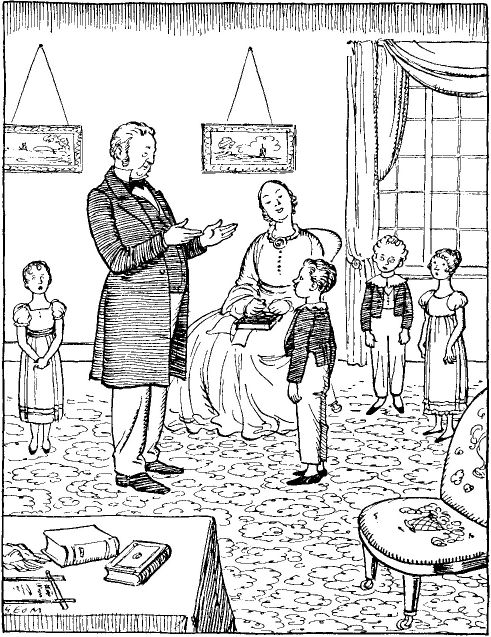
With this he led the expectant stripling to a window which commanded a view of the sweep of gravel in front of the mansion. Usually empty at this time of the morning, this was now occupied by the figure of Bodger, the coachman, who was leading a beautiful little Welsh pony, which at a signal from his master he now brought up to the window.
The delight of the fortunate lad at this munificent gift, which marked alike the generosity and the affluence of a fond parent, knew no bounds. Each child in turn was permitted to administer a lump of sugar to the pony, and when at last it was led away by Bodger and the family seated themselves at table it formed the subject of gleeful anticipation, in which all joined, though the enjoyment of the gift was at present to be confined to one.
This was explained by Mr. Birdikin, when he judged that the natural exuberance of childhood had had sufficient scope and that it was time that the voice of authority should be heard. 'I confess,' he said, 'that it was not without some hesitation that I decided to introduce Charles to the science of equitation at this early age. A moderate degree of skill in the use and management of the equine race is becoming to a gentleman, and I myself in my earlier years frequently took pleasure in bestriding a horse.'
'Papa on a horse!' ejaculated Fanny with a laugh. 'That would indeed be a sight to induce mirth.'
Mr. Birdikin's brow darkened. 'Pray subdue your tendency to untimely cachinnation, Fanny,' he said. 'With the increasing bulk that attends middle age in those whose duties call them to occupy their time in sedentary postures I relinquished the use of the saddle some years ago. But as a young man of some consequence I obeyed the wishes of my own father in joining in the pleasures of the chase, and was known far and wide as an intrepid pursuer of the vulpine species.'
'I well remember,' said Mrs. Birdikin, 'being carried in my father's chariot to a meet of the foxhounds. The mark made upon the heart of a modest but not unsusceptible maiden by the sight of your father seated erect upon his elegant steed led eventually to that happy union to which my children owe their being. Do you recollect, Mr. Birdikin, how one of the accidents attendant upon the manly sport led to your being deposited by your mettlesome mount in a duck-pond, and how the proximity of the carriage in which sat a young girl hitherto unknown to you enabled you to be conveyed back to your home with no further damage done than the spoiling of your fine scarlet coat and the risk of a rheumy distemper owing to your immersion, which was mercifully averted by an immediate retirement to the shelter of the blankets?'
'To that fortunate accident,' returned Mr. Birdikin with a courteous inclination of the head towards his helpmate, 'and to the handsome inheritance to which I succeeded not long afterwards I owe whatever satisfaction has hitherto attended me in my progress through this vale of woe.' He then explained that upon the demise of his father and his own approaching marriage he had thought it right to pretermit his pursuit of the dangerous sport of fox-hunting. 'But,' said he, 'I am not unmindful of the preoccupations that beset adventurous youth. You, my dear Charles, have already bestridden the homely and serviceable Jackass. You will now, under the tuition of our good Bodger, proceed somewhat farther by learning to control and guide your Pony; and it is my desire, if I am spared by Providence, to see you some day holding your own in the mimic contest of the chase on a Horse.'
'Indeed, Papa,' returned Charles, 'I shall do my utmost from henceforth to deserve the confidence you have so amiably displayed towards me, and trust you will no longer have to rebuke me for the thoughtless disposition which I am fully aware has given you cause for displeasure in the past.'
'There speaks my own son,' said Mrs. Birdikin, whose preference, if preference she had with regard to her offspring, was towards the mercurial Charles rather than to the more temperate Harry, in spite of the latter's closer resemblance to his worthy father. 'I conceive, Mr. Birdikin, that your birthday gift could not have been better bestowed than upon one who at so early an age shows himself anxious to leave the delinquencies of childhood behind him.'
'From henceforth,' said Clara, with the placable smile that so well became her childish features, 'I shall look to my brother for an example of that behaviour that is to be expected by our parents from all of us.'
'With that sentiment I would associate myself,' said Henry, 'while reserving to myself the right of resisting it should I not consider it of such a character as it would become me to follow.'
'You will always be at liberty,' remarked Fanny, 'to set your own example, which I do not myself propose to follow under any circumstances whatever.'
These several remarks may be taken as indicative of the widely different dispositions already showing themselves in the Birdikin children, and of the wisdom required from their parents in influencing them towards that stability of character to which all their efforts as right-living people not without consequence among their more highly-placed neighbours were directed.
For an account of the proceedings of a day so auspiciously begun we must postpone the expectations of our readers until a further chapter.
Mr. Birdikin, with that degree of worldly wisdom with which he tempered the promptings of a mind as much set upon morality as was consonant with his position as a man of property, had decided that upon the twelfth birthday of his elder son he would make known to him the place in life which he was called upon to fill. Before the diversions with which the day was to be marked were begun, therefore, he summoned the four children into the library, for he deemed it wise that all should hear the words addressed to Charles, and for their own sakes learn to estimate aright the subordinate position to which the females and the younger sons of a family of Quality were called upon by the designs of Providence to occupy.
'You, my dear Charles,' said he, 'will succeed me in the ownership of Byron Grove and the general esteem that goes therewith when I shall be called upon in the course of nature to lay down my earthly dignities and, as it were, to go up higher. It is my earnest desire that in the meantime you should fit yourself, by due observance of the rules of conduct in which you have been nurtured, to take that place in the world in which I trust that I myself have been proved not unworthy. While a reasonable enjoyment of wealth and position is proper to, nay, even demanded from, a man of consequence—otherwise why should he have been placed in a position of superiority?—you must not forget the welfare of those dependent upon you. As long as they remain contented with their lot in life and seek not in any way to claim equality with you or, as the dangerous and subversive phrase has it, to better themselves, it will be your part to smooth their path for them, so that neither man, woman, nor child on your estate shall actually starve, though the unavoidable exigencies of life may sometimes compel them to go what is called short; and, what is more important still, that none of those dependent on you shall be permitted, under pain of losing your countenance and support, to bear themselves in a manner unbecoming in those of an inferior order.
'To you, my dear Henry, is allotted a task of scarcely less importance. You will not enjoy so much of this world's goods as your elder brother, though, with the advantages that will come to you from your relationship to a high dignitary of our established and well-endowed Church, it is to be expected that early preferment to a position of handsome emolument will be found for you. It will be your part to watch over the morals of the flock that will be committed to your charge, and to keep them submissive to their betters and as uncomplaining as possible under such visitations of poverty and hardship as are sent to them as a reminder that they cannot expect to have it all, or even the greater part of it, their own way.
'You, Clara and Fanny, have been sent into the world in the inferior position of females, but you need not let that unduly disturb you. Woman was intended to be the solace and encouragement of man, and in due time, if you comport yourselves with that allurement combined with modesty with which your sex has been endowed with the express object of attracting to itself the notice of the other, you will obtain husbands capable of supporting you either in sufficiency or affluence according as you make use of your opportunities, helped by the efforts of your parents, which will not be wanting to bring about the desired results. I should wish you all now, during the half-hour which will elapse before we engage in the pleasures in store for us, to exercise your minds in retirement upon the duties of life which I have set before you.'
'But may I not, dear Papa, first make acquaintance with the pony which was your amiable birthday gift to me?' inquired Charles.
'I apprehend,' said Mr. Birdikin, 'that the pony, though reasonably fleet of foot, will not run away while you are applying yourselves to the reflections I have enjoined upon you. In half an hour I and your mother will be ready to set out on the expedition with which this festive day is to be marked. Until then you will kindly indulge me by doing as you are bid.'
'Come,' said Charles, when the four children had taken respectful leave of their parent and the door was between him and them; 'my Papa said nothing about where our colloquy was to take place. As it appears that my authority over you is to be greater than I have hitherto counted upon, I ordain that we repair to the stables and combine the duty enjoined upon us with the pleasure of inspecting my pony.'
'I would remind you,' said Henry, 'that affairs of conscience are to appertain to my department. I see nothing wrong, however, in taking the course you suggest.'
'As a member of the weaker sex,' said Clara, 'I conjecture that I shall be fulfilling my papa's behests by submitting myself to the guidance of the stronger.'
'Stronger be bl-w-d!' said Fanny, whose mischievous propensity to pick up and repeat indecorous expressions has already been commented on. She intemperately took to her heels and arrived first at the stables, where Bodger the coachman was ready to lead the pony into an adjacent paddock, where he opined that Charles would wish to mount the diminutive steed and to receive his first lesson in horsemanship.
The temptation was too strong for the children to resist. Assisted by Bodger, Charles ensconced himself in the saddle and the others followed him into the paddock, where all considerations of obedience were flung aside and the injunctions of their father were as if they had never been uttered. When Charles had trotted and cantered round the paddock it was suggested by Bodger that Henry should bestride the pony, and Charles, whose generosity of nature was stronger than the sense of responsibility he had so recently promised to cultivate, gave place to him, thus countenancing on the part of Henry direct disobedience to a command of their excellent parent, who had laid it down that at present the use and enjoyment of the pony should be for Charles alone.
Nor did the matter end there, for Fanny, casting to the winds all sense of female propriety, scrambled on the back of the jackass, which was feeding in the paddock, and, sitting astride in a posture that might have brought a flush of shame to the cheek of the most hardened, urged the not unwilling quadruped, by kicking its sides with her heels, to enter into a contest of speed with the hitherto well-behaved pony.
The pony, possibly seized with a spirit of emulation, possibly contemptuous of the homely animal now first brought to its notice, suddenly quickened its pace. The guiding-rein was jerked from Bodger's hand and Henry, as yet unused to controlling his spirited mount, was deposited upon his back upon the grass. At the same time the jackass executed a sudden elevation of its hinder quarters and a playful kick at circumambient space, and Fanny was likewise unseated from her highly indecorous position and precipitated on the sward.
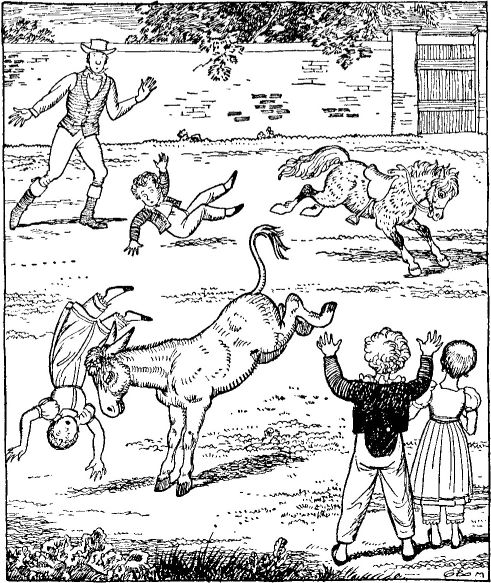
It was at this moment that Miss Smith, looking from an upper window, was made aware of what was going on. Horrified by what she saw she rushed headlong downstairs and made known to Mrs. Birdikin the double accident that had befallen her young charges before proceeding herself to the paddock to render what assistance it might be within her capacity to impart. She was immediately followed by Mr. Birdikin, who could scarcely believe his ears when informed by his spouse of the extent to which his commands had been disobeyed.
By a merciful interposition of Providence no harm to life or even to limb had resulted from what might have brought a disastrous end to the outrageous and lawless prank. So lost were the children to the enormity of their conduct that upon the arrival of their instructress all were laughing at the mishap, and Fanny was adjuring Bodger to 'catch the old Moke' so that she might repeat the dangerous and indelicate game.
Laughter, as may well be imagined, was quickly changed to its reverse when Mr. Birdikin appeared on the scene and without any delay administered that chastisement which the occasion demanded and a stirrup-leather made immediately convenient. The diversions by which the day that had opened so auspiciously was to be marked were countermanded, and Miss Smith was enjoined by her employer to exact double the tasks usually required of her pupils as a further punishment for their disobedience.
By these means the authority of a parent was vindicated and the path of duty was shown to be preferable to that of licence. A slight sprain of the elbow, owing to the severity of the punishment he had felt called upon to administer, was considered by Mr. Birdikin a small price to pay for keeping his children in the paths of rectitude, and he judged rightly that they would not soon forget the events of Charles's twelfth birthday.
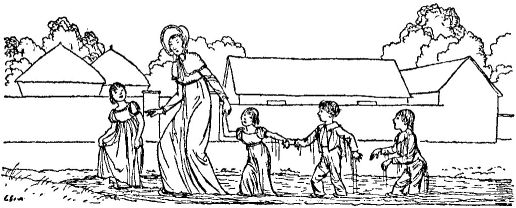
One fine morning in September a coroneted note was brought by a mounted groom from Bellacre Castle to Byron Grove, in which the Countess of Bellacre requested that the four young Birdikins should be brought over that afternoon to play with her own children, the Viscount Firebolt, the Lady Mary, and the Honourable John Firebolt.
This invitation was gratifying to Mr. Birdikin. During such seasons as the Earl of Bellacre was in residence at his country-seat a neighbour of such probity of conduct as the owner of Byron Grove, who was always ready to unlock the treasures of a well-furnished mind when in company, might have been expected to be welcomed to frequent intercourse with him. Upon the occasions on which they met in public the Commoner had shown by his ingratiating demeanour that a fuller measure of intimacy would be agreeable to him, but the Nobleman, while treating him with the civility that became his rank, had invariably hastened to remove himself from his immediate vicinity. Mr. Birdikin, after some years of endeavouring to lessen the distance between them, had taken this to indicate that on his Lordship's part that desire was absent. This invitation, however, seemed to show that a more neighbourly intercourse was now desired. The note was answered by Mrs. Birdikin, to whom it had been addressed, Mr. Birdikin himself advising upon the wording of the missive, so that it should express the right degree of cordiality together with the deference due to the rank of the recipient.
High were the anticipations of the four children as they were carried towards the stately edifice which was to be the scene of the afternoon's play, the boys in their best nankeen suits, the girls in freshly laundered sprigged muslin, and it is to be feared that small attention was paid to the cautions of Miss Smith, who had heard from an old nurse of the young Firebolts, resident in the village, that they were what she designated as 'imps of mischief'.
And so it proved to be. The Viscount Firebolt and the Honourable John, who were of about the same age as Charles and Henry, had no sooner set eyes on them than they challenged them to a bout of fisticuffs; and the Lady Mary, who was dressed in an old cotton frock that would have seemed more suitable to a cottager's child than to the descendant of a hundred earls, or thereabouts, took Clara and Fanny off to inspect her tame rabbits, and then led them to an adjacent farmyard, where they were presently joined by the four boys, and that rough play was set in hand which Mr. Birdikin had so strongly deprecated in urging Miss Smith to see that her young charges comported themselves with propriety during the afternoon's intercourse.
Miss Smith would no doubt have done her best to curb the boisterous propensities of all the children, but the Countess, herself addicted to the pleasures of the chase, and bringing up her children on a different principle from that followed by Mr. and Mrs. Birdikin, said to her, 'Pray leave them to play by themselves. You look as if you want a rest'.
Miss Smith allowed herself to be led into a handsomely furnished and comfortable parlour, where she was bidden by her distinguished hostess to entertain herself with Miss Edgeworth's latest romance, hot from the printers, and to forget all about the children for the next two hours. Her sense of duty was, alas! lulled by the seduction of the book and of the place. On the previous evening Mr. Birdikin had jocularly remarked to her that, if anybody felt inclined to rise early and gather mushrooms, he thought he could relish a dish of them with his breakfast. Miss Smith, anxious to make some return for all the consideration she had received from her employer, had left her bed before six o'clock and gathered the materials for the succulent repast. She had gladly forgone the sleep which her somewhat delicate frame required; but it is perhaps not to be wondered at that her present peaceful surroundings induced a drowsiness to which, after fighting it for a time, she gave way. The book dropped from her hand and she slept.
What was her surprise when she was presently awakened by the entry of none other than Mr. and Mrs. Birdikin, who had decided themselves to drive over and conduct their children home, anticipating before they did so a pleasant hour in the company of the Countess and possibly the Earl, with whom they were anxious to consolidate the excellent relationship already inaugurated. The Earl, however, was abroad with his dogs and his gun in pursuit of the elusive partridge, and his Lady had driven forth in her chariot.
Mrs. Birdikin elected to sit in the house while her husband, followed by Miss Smith, went in search of the children. Mr. Birdikin's brow was dark as he elicited from the instructress an account of the circumstances that had led to her forsaking the duty with which she had been charged, but the constraint he habitually placed upon himself prevented him at the moment from expressing himself upon it, and she followed him in silence, deeply conscious of the weight of his not undeserved displeasure.
The children were not at first to be found, but it was not long before their gleeful shouts were heard coming from the direction of the farmyard, and thither Mr. Birdikin and Miss Smith turned their footsteps.
The scene that met their astonished gaze was such as to cause the cloud upon Mr. Birdikin's brow to deepen. Upon a roughly-made raft in the middle of a pond that adjoined the yard were gathered the Viscount Firebolt and the Lady Mary, with Charles and Fanny. The other three children were bombarding them from the bank with lumps of mud, some of which they caught and returned with as much violence as could be imparted by their immature muscles. As Mr. Birdikin debouched upon the scene of combat from behind a barn, one of the gobbets, launched by the hand of the Viscount Firebolt, made impact with his hat and knocked it off his head.
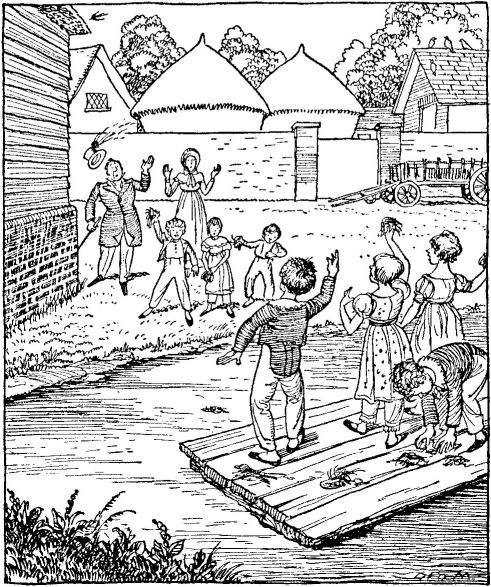
Though going far beyond the bounds of courtesy, this action might have been excused on account of the rank and youth of the assailant, but it was immediately followed by the discharge of further missiles from all the occupants of the raft, Charles and Fanny having lost all sense of propriety from the example they had all too readily followed, or they would scarcely have ventured thus to attack their own parent.
Nemesis, however, quickly overtook them. A blob of liquid mud thrown by Fanny impinged upon Mr. Birdikin's eye, and when he had regained his vision it was to see the raft overturned and the children immersed in the pond.
The protective instinct of fatherhood overcame in Mr. Birdikin's breast all other considerations. 'Save them! Save them!' he cried; and while Miss Smith obediently waded into the muddy water to render what assistance she could, he stood on the bank a prey to the liveliest alarm.
It was fortunate that the pond was no more than two feet deep, or the outrageous play could only have ended in tragedy. The children waded ashore muddy and dripping, and, although Charles and Fanny were sufficiently sobered by their immersion and the dread of what might be in store for them, the climax seemed to afford the Viscount Firebolt and the Lady Mary the height of amusement.
Mr. Birdikin did not conceive it to be his duty to administer rebuke to the children of others, especially as those others were of a rank superior to his own. He hurried Charles and Fanny back to the Castle in order to beg for a change of clothing for them, and was fortunate enough to find the Countess returned from her drive and in conversation with Mrs. Birdikin. Her Ladyship made light of the occurrence and put the wardrobe of her children at the disposal of the young Birdikins. To Mr. Birdikin's surprise she showed more concern at the bedraggled state of Miss Smith, and herself took the governess upstairs to provide her with the change of habiliments that was necessary, thus forgoing the pleasure she might have gained from further converse with her visitors.
Fortunately for the Birdikin children the Countess begged that no further notice should be taken of their delinquencies, and expressed the hope that they would repeat their visit to the Castle on a future occasion. Mr. Birdikin replied with an invitation to the young Firebolts to come to Byron Grove, for, although he could not wholly approve of their intemperate conduct, such was his breadth of mind and intense loyalty to the hierarchy of Rank that he was able to overlook the disquietudes of the afternoon in consideration of the closer contact they had brought him with his highly-placed neighbours. He thought well, however, on the homeward journey to warn Miss Smith that any further dereliction of duty on her part would lead to instant dismissal.
It was Mrs. Birdikin's exemplary habit to gather her children around her on Sabbath afternoons and impart to them that moral instruction which can best be impressed upon infant minds by maternal influence. A father's instructions were not missing in this happy and united family, and disobedience to them was punished with a strong hand, reinforced by rod, birch, or strap; but it is doubtful whether the more persuasive method of a mother was not as efficacious in implanting the desire to act aright without which correction is of little avail where wills are stubborn and unregenerate natures have still to be purged of moral obliquity.
'I propose for our exercise this afternoon,' said Mrs. Birdikin one Sunday when the children had trooped into the parlour in obedience to her summons, 'that we should follow the advice given to us by our worthy curate in his discourse this morning. Can any child inform me of the point to which I refer? You, Charles, as the eldest, shall speak first.'
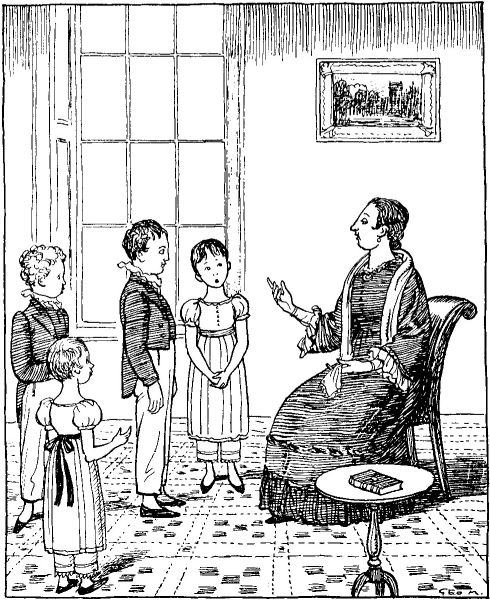
But Charles was unable to give a satisfactory reply, and Mrs. Birdikin gently rebuked him for indulging in wandering thoughts, remarking that a clergyman who gave himself the trouble of delivering a discourse of an hour's duration might at least expect some attention on the part of his hearers. 'Come, now, Clara,' she said, 'you, I am sure, will have brought something away with you worthy of engaging our thoughts.'
'To my mind,' replied Clara, 'the most striking utterance that fell from Mr. Guff's lips was his description of the feelings of the prophet Jonah on discovering himself in the whale's belly.'
'The word "belly",' said Mrs. Birdikin, 'though innocuous in the time of the prophet Jonah, is not one that befits the lips of a female child in our more enlightened era. But that was not the passage of Mr. Guff's discourse that I had in mind.'
'Was it not, dear Mama,' inquired Henry, 'that advice of our good curate to contribute of our means with a willing spirit when called upon to do so for a charitable object? I confess that it made such an impression on me that, instead of contributing my usual halfpenny to the collection, I deposited twice that amount in the plate.'
'And you were very careful that we should all see it,' said Fanny. 'I conjecture that the passage to which you refer, Mama, was that in which Mr. Guff advised his hearers not to esteem themselves better than they were. I thought at the time that this was particularly applicable to Henry.'
The old Adam was sufficiently strong in Henry to cause him to give a tweak to Fanny's hair, in reply to which she put out her tongue at him. But these exchanges were unnoticed by Mrs. Birdikin, who said, 'It was the passage following that advice which I had in mind. You will remember perhaps that Mr. Guff said it would be well if we were all to confess to others such misconduct as our consciences might from time to time reproach us with. I propose, therefore, that we shall all in turn search our memories for such lapses and bring them to light'.
The children appeared to be turning this suggestion over in their minds, and Fanny inquired, 'Will any misconduct of which we make confession be brought to the notice of our Papa?'
Mrs. Birdikin reassured her on this point, and Charles said brightly, 'Thank you, dear Mama, for devising so excellent a pastime for a wet Sunday afternoon. I have my own transgression ready, but you must take the lead by recounting one of yours'.
It is doubtful whether Mrs. Birdikin had had it in mind to make confession of any lapse from right conduct on her own part, but she made haste to reply, 'The faults of childhood, if not repented of at the time, are apt to rise up in judgment against the transgressor when he or she attains maturity. It is because I wish to spare you the pangs of outraged conscience in after life that I will make known to you a misdeed your mother committed in her early youth which has ever weighed upon her and would be well-nigh insupportable if a lifetime of right conduct had not withdrawn its sting.
'You must know, then, that when a young child not yet fully awakened to the sacred rights of Property, a regrettable vanity caused me to abstract from my Mama's dressing-table a brooch of considerable value and to pin it on to my frock in the seclusion of my bedchamber. When the brooch was missed I grew frightened and concealed it under a cauliflower in the kitchen-garden. My excuse must be that I knew that it would be discovered there when the gardener cut the vegetables. And so it was, but, alas! the gardener's dishonesty was such that, on finding the trinket, he sold it and retained the proceeds. The crime was eventually brought home to him and the brooch recovered; but you may picture the agony of mind I went through before this happy issue was brought about. Nobody would believe the gardener's story that he had found the brooch under a cauliflower, but until he was safely lodged in jail I hardly knew a happy moment. Let this recital be a lesson to you, children, never to depart so much as a hairbreadth from the paths of rectitude, and, if you are led astray, to make instant confession. Had I done so in this instance I might, nay, probably should, have been punished, but should have escaped such pangs of remorse as even now make me shudder to look back upon.'
'Your confession, dear Mama,' said Charles, 'encourages me to substitute a similar experience of my own for that which I had it in mind to acknowledge. Two days ago I abstracted from my Papa's table a box of lucifer matches, the half of which I have amused myself with striking. It had not occurred to me to hide the box under a cauliflower, and I shall now be glad to hand it to you and thus escape the distress of mind, and possibly of body, which you have so feelingly described.'
'The confession I have to make,' said Clara, 'is that when my Papa summoned us to attend him yesterday for examination in our course of study I was employed in cutting out paper roses, and so far forgot myself as to exclaim, "Oh, bother!"'
'My fault, I fear,' said Henry, 'was a graver one. Two days ago I espied among the letters on the hall-table one addressed in the handwriting of our governess to her aunt, Mrs. Clott, and, knowing that my Papa has forbidden her to involve us in further communication with the wife of an ironmonger, I wished to assure myself that his instructions had been obeyed. I broke the seal of the letter, and, finding that it was free from offence in that respect, though I regret to say that Miss Smith made some complaint of the coldness of her bedchamber, I took wax and sealed up the missive again.'
'Then you are a dirty little sneak and tell-tale-tit,' broke in Fanny, 'and when I grow up I shall not acknowledge you as my brother!'
'Hush, hush, Fanny!' said Mrs. Birdikin. 'The fault to which Henry has confessed was a grave one, for it is not permitted to tamper with the correspondence of others however lowly their position. But his desire to satisfy himself that his father's wishes were carried out was not wholly reprehensible, and he has now confessed his fault. Instead of sitting in judgment on him do you confess one of your own, and let us judge which is most to blame.'
Thus adjured, Fanny collected herself and said, 'I caught a hedgehog yesterday just before my Papa called us in to him, and put it under a flower-pot, intending to transfer it later on to Henry's bed. But when I went out again the flower-pot was overturned and the hedgehog had escaped'.
'There,' said Mrs. Birdikin, 'you have an instance of an intended sin prevented by an interposition of Providence. Would that all faults were thus made impossible of achievement!'
'But I didn't want to be prevented,' said Fanny. 'I shall try to find another hedgehog to-morrow.'
'In that case,' said Mrs. Birdikin, 'you will be suitably punished by your father.'
'Now that we have all made our confession,' said Charles, 'I propose that our dear Mama shall pronounce upon the best one. I should be inclined myself to give the palm to her own confession of a fault which involved the punishment of another.'
'Indeed, Charles,' said Mrs. Birdikin with some indignation, 'it ill becomes you to sit thus in judgment upon your mother, who has long since repented of what was after all no very serious fault in a child not yet of an age to estimate the seriousness of all faults. No further notice will be taken of the far more serious delinquencies to which you have all confessed on this occasion, but look well to it that you mend your ways or trouble will ensue.'
This ended the afternoon's instruction, but Mrs. Birdikin did not again invite her children to a confession of faults for which she had promised absolution beforehand, judging it better that they should be discovered and dealt with in the usual way.
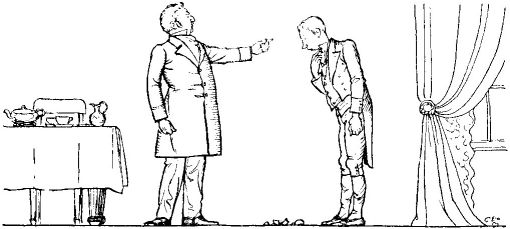
One morning as the Birdikin family was seated at the breakfast-table, the footman, John, who was usually as deft as he was willing in the performance of his duties, earned more than one rebuke from his master for his awkward handling of the implements of his service. At last, when he had dropped and broken a valuable porcelain tea-cup, Mr. Birdikin could no longer restrain his anger and ordered him from the room, saying that he preferred to be waited upon by his children rather than submit any longer to the ministrations of an oaf.
'I observed, dear Papa,' said Clara, the little Peacemaker, when the footman had left the room in a burst of tears, 'that John's face was pale and his hands trembled as he supplied us with our viands, and I cannot forbear the impression that some serious stroke of misfortune has befallen him.'
'I know what it is,' said Fanny. 'His mother was brought to bed two days ago and yesterday his father fell from a tree and broke his thigh.'
'Let us repair at the earliest possible opportunity,' said Mrs. Birdikin, 'to the abode of these poor people and take with us such succour as our sense of benevolence may dictate. I apprehend, Mr. Birdikin, that John's not unnatural solicitude on behalf of his parents may on this occasion excuse him for his departure from the conduct that you rightly expect from him.'
'Indeed,' said Mr. Birdikin with a courteous inclination of the head towards his helpmate, 'I would not for a moment impugn the promptings of a heart so full of benignity as that of Mrs. Birdikin. John's offence shall be wiped out by a deduction from his wages of the value of the vessel he has destroyed. Let us consider the form which our charitable contribution to the needs of these unfortunate people is to take. You, I know, will supply from larder and pantry what will support the coarse fare suitable to the station of cottagers when in health. I will contribute the bottle of port wine with which I should have regaled myself yesterday evening had I not found it a trifle corked. Though rendering it unsuitable to my palate, the slight disqualification will hardly be noticed by theirs.'
'I would recommend,' said Henry, 'that there should be included in our charitable grant a bundle of assorted tracts, for, while the nourishment of the body must not be neglected, are we not taught that it is of still more consequence that those in a position of superiority should concern themselves with the souls of those who owe them deference?'
This unworldly spirit, shown so early by one destined for the duties and rewards of the clerical profession, could not but bring gratification to Henry's parents. But Fanny, who had not yet undergone that conversion from the promptings of her lower nature which in her brother's case was already bringing forth such pious fruit, remarked, 'Would it not afford more entertainment to the sufferers if Henry were to read to them from the adventures of Spring-Heel Jack, with which he was regaling himself in the wood-shed yesterday?'
Henry made haste to explain that he had found the publication mentioned in a drawer in John's pantry, and had wished to assure himself that it was fit for perusal by the footman; and Fanny was rebuked by her father for her censorious reference to her brother's well-intentioned action.
Mr. Birdikin himself interrogated the footman upon the details of the accident that had befallen his father, and did not rebuke him when a further gush of tears testified to his gratitude for the benevolence so abundantly shown by his strict but humane employer.
John's family occupied a cottage on the estate of Captain Rouseabout, in whose service the father was employed as woodman. Mr. Birdikin's low opinion of this gentleman, for such he was by birth, if not by conduct, caused him to express a doubt whether the poor labourer's misfortune might not bring upon him dismissal from his occupation. 'A man of the reprehensible habits of our neighbour,' he said as he walked towards the woodman's cottage with his wife and family, John the footman following them at a respectful distance with the laden basket, 'is usually devoid of all bowels of compassion. It would not surprise me to learn that this man, who has suffered disablement in his master's service, has already received notice to quit his cottage.'
'In that case, dear Papa,' said Clara, 'can you not provide him with one until he is able to resume his employment, and take him into your own service?'
'That, I fear, is impossible,' said Mr. Birdikin. 'Nor would it be altogether desirable. Our humane laws provide food and shelter for those of the lower orders who through no fault of their own have lost their employment, and it would not be well to tamper with their working. As long, however, as this family is allowed by Captain Rouseabout to remain in their present situation I shall make it my duty to show him that there are those who are eager to fly to the relief of distress, and thus bring shame, if he is capable of such a feeling, upon one who is ever ready to scoff and jeer at all tokens of high-minded conduct.'
The walk of over a mile seemed short to the little party intent upon their charitable object, and ere long the woodman's lowly cot came into view. A family of young children were playing in the neatly-kept garden, and an older girl appeared at the doorway as Mr. Birdikin stepped up the path and respectfully bade him and his lady enter, if it should be their will to do so.
'My will,' said Mr. Birdikin, 'is ever to show that benevolence towards the deserving poor which is too often, alas! met with ingratitude. I trust it will not be so in this case. You, children, will remain outside, for such abodes as this are apt to be the breeding-ground of contagious disease, perilous to those delicately nurtured. Damsel, lead on!'
Mr. and Mrs. Birdikin entered the cottage, followed by John with the basket. The four children of the woodman stared at the young Birdikins as if they had been visitants from heaven, as indeed they might well have been, coming as they did on such an errand of mercy.
'Come,' said Charles, 'let us engage in a game of tag or hide-and-seek, and see whose legs are fleetest.'
'Might not Henry prefer to take advantage of the situation to impart some moral instruction to these children?' asked Fanny. But Henry himself elected to play at hide-and-seek. Sides were formed and the air soon rang with the gleeful shouts of the children, those of the woodman quickly losing their awe of the gentility of their playmates.
Ten minutes or so had passed in the merry sport when Fanny, who had been hiding behind a hedge, leaped from the bank into a grassy ride and narrowly escaped being trampled underfoot by a horse, the approach of which she had not noticed. The horse was bestridden by a gentleman, who quickly reined it up and said, 'Halloa, my pretty little dear, do you want your brains dashed out?' Without further ado he bent down and, seizing the frightened child, set her in front of him on the saddle, at the same time printing a resounding kiss on her infantile cheek.
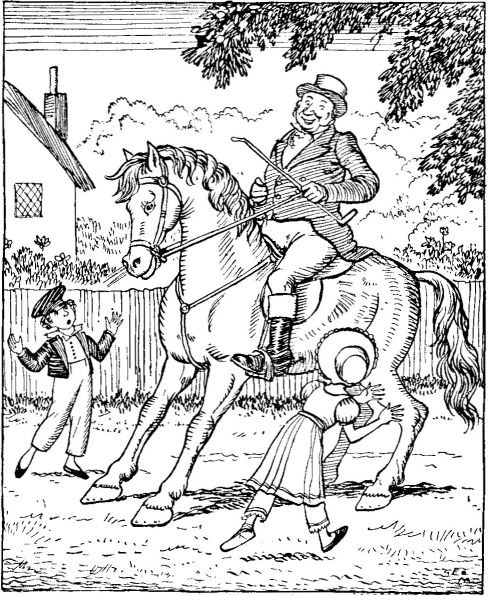
What was Fanny's surprise, when she had so far recovered from her fright as to steal a look at the somewhat rubicund and weather-beaten face of her rescuer, to find that it was none other than that of Captain Rouseabout, whom she had been taught to regard as in league with the Evil One. But there are few, however debased, whose better natures are not touched by the innocence of childhood. Upon hearing from Fanny of her parentage and what had brought her hither, Captain Rouseabout emitted a rude guffaw, but made no further comment. On reaching the gate of the cottage, to which he tied his horse, after dismounting and lifting Fanny from the saddle, he presented her with a bright sixpence, accompanying the gift with the whispered remark, 'Not for the missionaries', and another burst of uncouth laughter. Then he gave a loud 'View-halloo!' and entered the cottage.
Fanny informed her brothers and sisters of the identity of the new visitor, and the children lingered in the garden until their father and mother emerged from the cottage and the steps of all were turned homeward.
There was a cloud upon Mr. Birdikin's brow as the walk was commenced, and he kept silence until Mrs. Birdikin said, 'I am glad at least that these poor people are to be relieved from want until the breadwinner can again pursue his avocation'.
Mr. Birdikin's brow cleared. 'But for our errand of mercy,' he said, 'it is doubtful whether one so lost to all sense of propriety as Captain Rouseabout would have exercised the clemency which has now been shamed from him. His barefaced request to me to trust him to look after his own people was a mere covering-up of his indebtedness to my example only to be expected from such a man. Let us remove him from our thoughts.'
'I think,' said Fanny, 'that Captain Rouseabout is the most agreeable gentleman I have ever met, and when I grow up I shall marry him.'
As the result of an invitation already given and accepted, the three children of the Earl and Countess of Bellacres were brought over to Byron Grove one afternoon to disport themselves with the young Birdikins. It was unfortunate that the day originally fixed upon for this entertainment was found to be inconvenient to the Countess, and she had herself written to Mrs. Birdikin apologizing for any inconvenience she might be put to, and proposing a date two days later. For that afternoon the curate's two children, Thomas and Lucy, had been invited, and Mr. Birdikin felt that it might not be congenial to the Earl and Countess that their titled offspring should mix upon equal terms with those of a clergyman who was not even beneficed. In ordinary circumstances it would have been easy enough to put off the young Guffs, but the curate and his wife were journeying into the next county, where there was a question of his being preferred to a living, and Mr. Birdikin, with that large-minded generosity which marked his dealings with those who were, in whatever degree, dependent upon him, had undertaken that their children should be under the care of Miss Smith for the day. He judged that if these circumstances were fully explained to the Countess she might not object to the merely temporary intimacy, and bade Mrs. Birdikin assure her ladyship that a careful eye should be kept on the curate's children, so that they should not overstep the bounds of respect due from them to their high-born playmates. He judged aright. No reply was received from the Countess, but in the afternoon the Viscount Firebolt, the Lady Mary, and the Honourable John Firebolt made their appearance at Byron Grove.
Mr. Birdikin himself received his young guests, and, standing upon the steps of the porch, exhorted them, while making use of every opportunity of innocent enjoyment, to see that the afternoon should be free from quarrelsome disputes or mischievous play. He was proceeding to a well-considered homily upon the duty laid on those of a higher standing to set a good example to those of a lower, when the Viscount Firebolt, edging towards him, tipped his hat over his nose and then, with a loud whoop, raced away, to be immediately followed by Thomas Guff, who so far forgot what was owing to his and his parents' benefactor as to echo the cry of derision raised by the author of this unseemly prank. And such, alas! was the force of bad example that all the children joined in the precipitate flight and Mr. Birdikin was left alone with Miss Smith, whom he adjured to follow them and to warn them that any further insubordination would result in the curate's children being sent home and his own feeling the full force of his hand.
Miss Smith had endeared herself to her young pupils by her readiness to join in their infantile sports, and they were accustomed to look to her for the invention of the games from which enjoyment could be derived in the hours not devoted to study. This was not understood by the Viscount Firebolt, who, when Miss Smith was seen approaching them, said, 'We don't want a governess interfering with us. Let us run away'.
He was enlightened by Henry, who said, 'Miss Smith, though of a birth more allied to that of Thomas and Lucy than of ourselves, is well capable of taking a lead in our diversions'.
The slighting reference to him and his sister caused Thomas to strike Henry upon the nose with his fist, and when Miss Smith arrived upon the scene the two boys were rolling upon the ground in vigorous combat, while the Viscount Firebolt was dancing about in high glee, squaring his fists and offering to 'take on' Charles, or Charles and his own brother together, and the Lady Mary was inviting Clara, Fanny, and Lucy to an embroilment by no means suitable for female children.
Miss Smith parted the combatants and secured a temporary peace by suggesting a game of Red Indians, which fell in with the inclinations of the young Firebolts as providing opportunities for the mimic warfare in which their energy and spirit exulted. Sides were chosen and the happy play, on lines laid down by Miss Smith, was set in hand.
An hour later Mr. Birdikin, wishing to assure himself that the children's play was proceeding in orderly fashion, came out into the garden and, hearing no sounds to inform him of their whereabouts, proceeded along a shrubbery path in search of them.
What was his surprise upon coming to a clearing among the thickly growing shrubs and trees to find the inanimate form of Miss Smith stretched upon the grass, her wrists and ankles pegged to the ground, her position only saved from indelicacy by her skirts being decorously disposed to cover the latter.
Mr. Birdikin had no time to conjecture what outrage was in contemplation upon the apparently lifeless governess, for, without any previous sound to warn him, a cloth was thrown over his head, his hat, already the mark of attack, being knocked off, and a rope passed round his body, pinioning his arms to his sides. It was not until he was thus rendered helpless that the silence was broken by a series of piercing yells, imitating those in use by savages, his legs were tripped under him, and he sat heavily on the sward with a jolt that caused him acute discomfort and no less annoyance.
It must be explained that the play had reached the point at which Miss Smith, representing the wife of the settler, had been captured by the Red Indians, who had disposed of her in the manner already described near the arbour, which stood for the settlers' cabin. After a certain interval she was to raise her voice in cries that would attract the white men to her rescue. The Reds would then spring upon them from an ambush and a fight would ensue in which all the Indians would finally be killed, coming to life again in order to partake with their captors of the refreshment that by this time would have been brought to the arbour.
It was at the most critical moment of this ingenious play that Mr. Birdikin arrived upon the scene and was dealt with in the way already described. Had his reception been of a less ungentle nature he might well have joined in the sport, for his sense of parental authority by no means prevented his occasionally unbending with his children, and his gift of jocularity was often used to enliven his intercourse with them. But the outrageous liberty taken with his person was very far from the respectful and appreciative attitude which he expected when he unbent so far as to jest with them, and it was soon made apparent by his struggles and the sounds that came from under the cloth which enveloped his head that he was not now in the mood for frolic.
It was Miss Smith, throwing off her own shackles, who came to his rescue and released him from his ignominious bonds. But this was not done without loud protest from the attacking savages. Mr. Birdikin's own children would hardly have ventured to disregard the signs of his displeasure, but the young Firebolts and Thomas Guff did their best to impede Miss Smith in her exercise of release. When Mr. Birdikin's eyes were free to see, his mouth to utter, and his hand to strike, he caught the curate's son a sound buffet on the side of the head. 'Depart from my presence, graceless boy!' he ordered him. 'Your parents shall be informed of the infamous conduct with which you reward my bounties.'
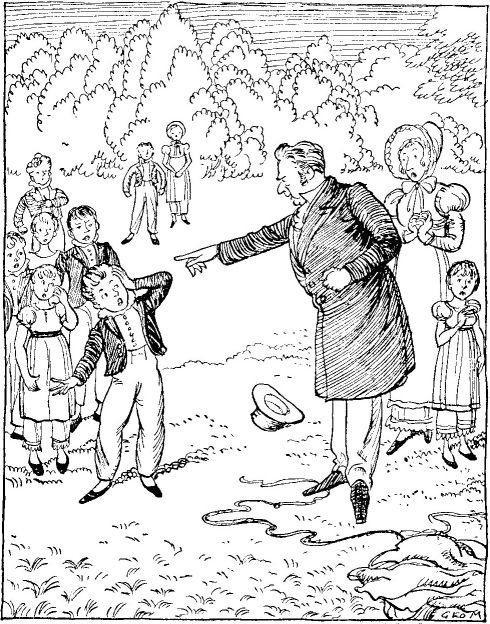
Lucy, a gentle timid child, burst into tears at this pronouncement of her brother's disgrace, and the young Viscount Firebolt, who had chosen her to represent his squaw, spoke up boldly. 'If he goes, I go,' said the young nobleman or nobleman-to-be. 'My own father would not thus bear himself towards one who was but taking his part in a game.'
Mr. Birdikin's nimbleness of wit and the self-control which he habitually practised came instantly to his aid. He smiled paternally and said, 'I did not apprehend that I was being invited to a game of make-believe. The introduction was a thought too sudden. Play on, children. Play on!'
With that he turned on his heel, picked up his hat, and left them. Nor did he afterwards visit his displeasure upon the delinquents, except in rebuking Miss Smith for encouraging roughness of play and for the questionable state in which he found her.
'If you do not respect yourself,' he said, 'you cannot win respect from others. Pray take a lesson from my own method of dealing with the late occurrences and seek to acquire that dignity of bearing which alone can raise you in the world and cause your deficiencies to be overlooked.
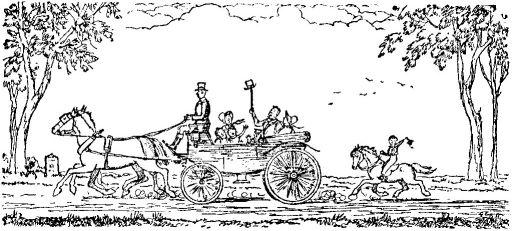
Although his own status as a man of property was well established, Mr. Birdikin had relatives whose position in the world was less distinguished. One of these was a widowed aunt, whose husband had amassed a considerable fortune in Trade. Such a connection could not but be abhorrent to Mr. Birdikin's nice sense of social values, but he judged it right, in view of her testamentary dispositions, not to withdraw his countenance from Mrs. Purport, or Aunt Maria as she was designated in the family circle, and she was a not infrequent visitor to Byron Grove.
On the occasion of one such visit an expedition was made to the seaside town of X, Mr. and Mrs. Birdikin, with Mrs. Purport, Henry, Clara, and Fanny, being transported in the family chariot, and Charles riding his pony, which by this time he was well capable of controlling.
Aunt Maria, who, although approaching her allotted span of life, was of a buoyant and sprightly nature, insisted upon enlivening the journey with song, in which she encouraged the children to join. Mr. Birdikin thought well to humour her so long as their route lay along country roads upon which there were few travellers, and lifted his rich baritone in the chorus of 'With a rumti-tumti-toodli-oo' with which each stanza terminated, to the delight of the children, who were not accustomed to see their parent in rollicksome mood, and lifted their own voices in still shriller chorus in consequence.
The road to X ran past the stately entrance-gates to Bellacre Castle, and Mr. Birdikin requested that the singing should cease as they neared them. But this did not suit Aunt Maria, who broke into another stave in praise of various alcoholic beverages, of which Mr. Birdikin would not have approved in any case in the presence of young children. The refrain of this ditty, however, which contented itself with lauding the properties of barley, hops, and vines, he found unobjectionable, and, upon being prodded in the ribs by his relative's elbow, he trolled out the harmless words, and, when the gates giving entrance to Bellacre Castle were passed, elevated his hat upon his stick to indicate that he was in accord with the spirit of rejoicing to which Aunt Maria was giving expression.
But what was his dismay when, upon turning a corner, they came full upon the Earl and Countess of Bellacre, who were taking a morning airing with their dogs.
A veil must be drawn over the feelings of Mr. Birdikin at this encounter. Even Bodger, the coachman, prompted by the general atmosphere of hilarity, was joining in the chorus and waving his whip. The dignified equipage which he was driving might have been a hired vehicle devoted to the low-bred joviality of a party of excursionists for all that an observer could have told. His Lordship, however, though no doubt surprised by what he saw and heard, was pleased to convey a greeting to his neighbour by waving his own hat and giving tongue to a 'View-halloo' as the carriage was driven past him. Mr. Birdikin's feelings were somewhat soothed by this act of courtesy from a nobleman in whose opinion he was anxious to stand well; but they were now approaching the confines of X and he exercised his authority to forbid any further exercise of vociferation.
This was made the more easy because Mrs. Purport had been struck by the appearance of the Earl and Countess, and desired information about them. This Mr. Birdikin supplied, informing her with the dignity and modesty which became him that, while claiming no equality of rank with his distinguished neighbours, he was yet on terms of close intimacy with them.
'Then why, pray,' inquired Mrs. Purport, bridling, 'have you never made me acquainted with his Lordship and her Ladyship? Ain't I good enough?'
Mr. Birdikin was dispensed for the moment from meeting this inquiry by Clara, who, aware that her father might welcome a change of subject, said, 'Now that we are going to X, may we not, dear Papa, pay a visit to our kind friend, Mrs. Clott?'
It has already been related how Mrs. Clott, a relative of Miss Smith, who filled the position of governess at Byron Grove, had entertained the Birdikin children on a previous visit to X. The fact, however, that her husband was engaged in retail trade as an ironmonger had made any pursuance of the acquaintanceship impossible, and Mr. Birdikin said firmly, 'Your request, Clara, shows you to be as yet unaware of the barriers erected by Providence between people of birth and property and those whose avocations involve the handling of commodities in the way of trade. In her own sphere of life Mrs. Clott is no doubt a worthy God-fearing woman, but that sphere does not permit of her mixing on terms of social equality with those above her, alike in the estimation of the world and the sight of Heaven. Nor, I am sure, would she wish it'.
'I love Mrs. Clott and could wish she were my aunt,' said Fanny, who was beginning to exhibit a rebellious spirit against the utterances of parental authority which would need a strong hand applied to her person to put down if persisted in.
Mr. Birdikin was about to intimate as much when Henry interpolated the remark, 'For my part I am content with my Aunt Maria in that relationship. The benefits she is pleased to shower upon us in the form of candies, comfits, and lollipops merit a return of gratitude on our part which is ill-represented by praise of a Mrs. Clott, who occupies, as my Papa has pointed out, a far inferior position in society.'
This speech was not unpleasing to Mrs. Purport, who liked the benefits she conferred to be suitably acknowledged. 'Who is this Mrs. Clott?' she inquired. 'My dear husband had a relative of that name employed in the hardware industry. Can it be that these are one and the same?'
Further elucidation indicated that it was indeed so, and upon their arrival at X Mrs. Purport insisted upon being driven straight to the establishment in which Mr. Clott carried on a thriving trade in ironmongery, both for agricultural and domestic use. Mr. Birdikin's feelings amounted well-nigh to anguish as he was compelled to take in his the hand of a man who wiped it upon an apron before offering it, and the glass of sherry wine with which he was presently forced to regale himself in Mrs. Clott's parlour went very near to choking him.
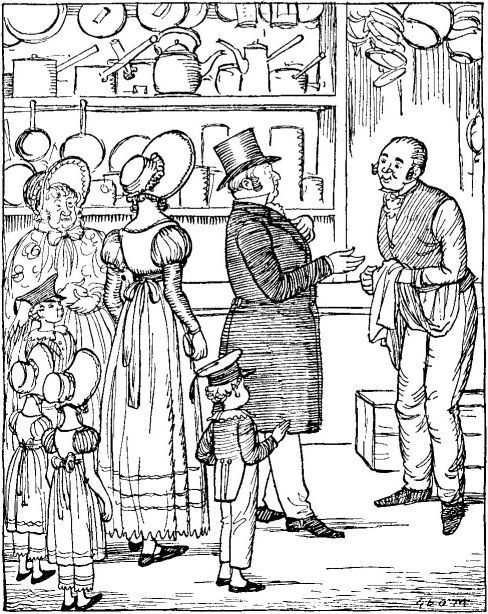
He did not see his way to expostulating against this affront to his dignity so long as he was actually in the presence of Mr. and Mrs. Clott, but on the homeward journey he did venture to point out to Mrs. Purport that for a man in his position, accepted on terms of intimacy by such as the Earl of Bellacre, a connection, however distant, which the chance of marriage had brought with a person in Mr. Clott's lowly sphere must at all costs be kept from public knowledge.
To which Aunt Maria replied, in the language which, unfortunately, she was all too ready to use within hearing of the children, 'That's all my eye and Betty Martin. If you want to see the colour of my money when I'm gone——'
But this was too much. By an immediate loud clearing of the throat Mr. Birdikin prevented the conclusion of her speech from being heard, and, in despair of creating a diversion by any other means, himself broke into the chorus of a song, in which he was followed by the children. The immediate danger of their hearing anything unfitted for their infant ears was averted, but the disturbance caused by Aunt Maria's claiming of relationship with those of an inferior order was not yet at an end, as a further chapter will show.
It has been recounted how Mr. Birdikin's relative, Mrs. Purport, or Aunt Maria, had discomposed him by claiming acquaintanceship with a tradesman of the name of Clott, whose wife was an aunt of Miss Smith, the resident instructress of the young Birdikins. Mr. Birdikin's annoyance at having been forced into this contiguity was tempered by the consideration that to keep Aunt Maria in good humour would react favourably upon the terms of her last will and testament; but he felt that even this might be purchased at too dear a price when she requested that Mr. and Mrs. Clott should be invited to dine at Byron Grove.
'I beg you to consider,' he said in dignified protest, 'that my humble board has been graced by none except those of established position. It is true that on rare occasions I have bidden our excellent curate and his wife to partake of a repast here, for I hold that Mr. Guff's sacred office renders him a fit object for discriminating hospitality. But to receive an ironmonger and his wife at Byron Grove, this would be to turn my back upon all the principles which I have sought to uphold, not only for my sake and that of my wife, whose maternal uncle, as you are aware, holds episcopal office and must be preserved from contamination by the vulgar herd, but of my innocent children, whom I have ever striven to bring up unsullied by contact with anything low.'
To which Aunt Maria replied, 'Hoity toity! Have you forgotten, Zephaniah Birdikin, that our grandfather began life with a pick and shovel?'
This statement caused Mr. Birdikin's cheek to blanch. It was true that the wealth that he had inherited had come from the successful enterprise of a contractor, who may or may not have commenced life in humble circumstances. Mr. Birdikin preferred to assume that he had not, and was well aware that Aunt Maria was only assuming the contrary for quizzical reasons. 'Surely,' he said, 'for your own sake you could not wish such an idea to get abroad. You have been received with respect and affection into the bosom of my family, generous tokens of your own affection have been showered upon my children. Think well, I beseech you, before you blast their blameless lives with such a stigma.'
'Blast my eye!' replied Aunt Maria, who, however, was not unmoved by this manly and earnest appeal. ''Twill do your children no harm to make friends with an obliging woman like Mrs. Clott, who is own mother's sister to your excellent Miss Smith. As for Mr. Clott, he is a man of merry humour, and if I have a fault to find with Byron Grove it is that life here is lacking in diversion. If you do not see your way to obliging me in this matter I shall cut short my visit and go to those who have a livelier sense of what is owing to me.'
Mr. Birdikin knew well that this was a reference to some relatives of the late Mr. Purport, whom he suspected of designs upon Aunt Maria's property. To save her from being imposed upon, therefore, he gave way. 'I cannot consent,' he said, 'to receive Mr. and Mrs. Clott in person, but a visit from Mrs. Birdikin and myself to her uncle the Bishop is long since overdue. I will apprise his Lordship that we will drive over to P——chester on whatever day next week will be convenient to him, and on that day, which we shall spend in the most elevated society, you may engage yourself in entertaining a Mr. and Mrs. Clott.'
'I shall prefer your room to your company,' said Aunt Maria; and the matter was so arranged.
On the afternoon appointed Mr. and Mrs. Clott drove over from X and partook of the hospitality offered them by Mrs. Purport at Mr. Birdikin's expense. The dinner provided for them was such as to do credit to his establishment, and he had himself produced from his cellar the wines which he thought suitable for the entertainment of Mr. Clott. They were not such as he would have put before a guest of a higher quality, but Mr. Clott was enlivened by them to the extent of producing for the company several little tricks of juggling with oranges, napkins, wine-glasses, and the like, which caused infinite delight to Aunt Maria and to the Birdikin children, who with Miss Smith had been permitted to partake of the repast.
At five o'clock the ladies and the children arose from the table, and Mr. Clott was left to the degustation of a bottle of port wine, with strict injunctions to join them in the garden in not later than an hour's time to partake of tea in the arbour and, if he was so minded, to give them further proof of his ingenuity as an amateur conjurer.
With this request he willingly complied. He demanded a hat, a rabbit, three silk handkerchiefs of different colours, a watch, half a dozen eggs, and some other properties. These were produced for him by the children and he proceeded to perform the most prodigious feats with them. One that was much admired was to wrap up the gold repeater watch which Fanny had obligingly procured from her father's dressing-table in the three handkerchiefs, and with a flick of the fingers to produce these tied together, the watch having disappeared.
At this moment a chariot drove up to the door, in view of the little company assembled in the arbour, from which alighted the Earl and Countess of Bellacre and their children, who had come to pay a visit to their neighbours at Byron Grove. It was explained to them by Charles, who very properly took the place of his father in this emergency, that the return of his parents was momentarily expected, and on his invitation the high-born visitors condescendingly made themselves part of the audience of Mr. Clott's final exploit.
This was to break the six eggs into Mr. Birdikin's hat, to stir them with a silver spoon, and to produce an omelette of the kind which Mr. Clott assured his audience they had never seen before.
He had broken three of the eggs when another chariot drove up, and the trick was interrupted for Mr. and Mrs. Birdikin to be apprised of the honour conferred upon them by their aristocratic neighbours and to adapt themselves as far as possible to the awkward situation that had arisen in consequence of their finding themselves obliged to share the hospitality of Byron Grove with Mr. and Mrs. Clott. In reply to his explanations the Earl affably intimated that he was quite satisfied with his company and begged that the trick that had been interrupted should now proceed.
The interruption, however, had withdrawn Mr. Clott's attention from his apparatus, and the Viscount Firebolt had taken advantage of it to break the three remaining eggs into the hat. Instead of proceeding triumphantly to the consummation of his ingenious feat, Mr. Clott was forced to explain that he himself had only appeared to break eggs into the hat, and that the subsequent interference had spoilt not only the hat but the trick. 'What my magic was designed to produce,' he said, 'from the beating up of these eggs was the watch which had disappeared from your sight a short while ago. But I suspect that the watch itself has been abstracted by one of the company, and I must request you all to keep your seats while I bring the culprit to light.'
He then proceeded to feel the pockets not only of the children but of the Earl and of Mr. Birdikin, who could scarcely contain his annoyance at this further mark of disrespect from a man whom he would have expected to be covered with confusion at the situation in which he found himself.
But Mr. Clott had recovered his self-possession. 'I should hardly have expected,' he said, 'that a lady would have so far forgotten herself as to conceal about her person a valuable watch that does not belong to her, but I must at all costs restore it to its rightful owner.'
He then affected to search the children and Miss Smith. If he had essayed to lay hands upon the Countess or upon Mrs. Birdikin, Mr. Birdikin could scarcely have restrained himself from bringing the indecent buffoonery to an end. But he proceeded to experiment upon the person of Aunt Maria, and triumphantly produced the watch as it were from under her cap.
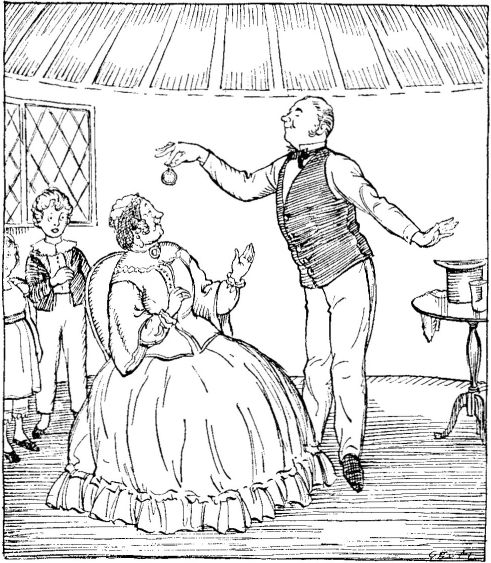
Aunt Maria shrieked with laughter at this result, especially when Mr. Clott restored the watch to Mr. Birdikin and invited him as a magistrate to charge Mrs. Purport with its theft. The Earl and Countess also showed themselves amused, and invited Mr. Clott to exhibit his tricks at Bellacre Castle on the occasion of a village fête which was to be held there in the following week.
It was to invite Mr. and Mrs. Birdikin and their children to participate in this entertainment that they had come to Byron Grove, and they graciously included Mrs. Purport in the invitation before taking their leave.
Mr. Birdikin was therefore somewhat consoled for the untoward circumstances in which he had been involved. Fanny was chastised for taking the watch from his room, and Charles for producing the hat, which could not be worn again, and Mr. Birdikin expressed himself strongly to Miss Smith over the indecorous behaviour of her relative. But to his surprise Miss Smith did not take his strictures in the submissive spirit to which he had been accustomed from her. The reason for this change of attitude on her part will be explained in a further chapter.
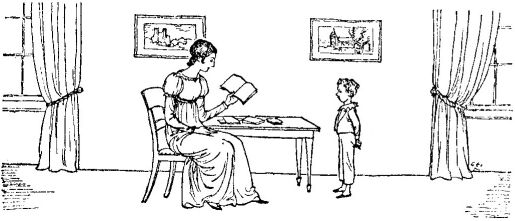
Miss Smith, though a competent and conscientious instructress of youth, was unfitted by a constitutional delicacy of frame to control the unruliness or turbulence to which children are sometimes addicted. She was not, however, subjected to much of this at Byron Grove, for she had succeeded in gaining the affection of her young charges; and if at any time Charles or Fanny, the one by a natural exuberance of spirit, the other by some innate hostility to authority, showed an inclination towards impropriety of conduct, they could usually be curbed by the threat of reporting their conduct to their father. For Mr. Birdikin kept in his own hands the chastisement of his children, and as his hand was heavy and his wrist supple, they preferred not to submit themselves to the risk of his displeasure. Clara's tractability of disposition and Henry's strong sense of what was required of him as a future clerical overseer of morals rendered them less liable to these outbreaks of insubordination; but there was still something of the old Adam not yet eradicated from Henry's nature, and it happened sometimes that he set himself to annoy Miss Smith in the exercise of her duties out of a contrariety of spirit which he would have been the first to deplore in others.
One morning Miss Smith arose with a headache which made it necessary for her to call up all her sense of duty in order to fulfil the tasks of the morning. She set the children to their copy-books and sat herself in a chair by the open window, hoping that the interval of rest and the fresh air would ease her headache and enable her to carry out the rest of her duties with less distress to herself. She closed her eyes for a few minutes, and when she arose to overlook the work done by her pupils she was already feeling better.
It was Miss Smith's custom to allow the children to choose their own sentences for the exercise of calligraphy. She then wrote them out in a fair hand and they copied them. This morning Henry had chosen the inspiring words of Admiral Viscount Nelson: 'England expects every man to do his duty', but when she came to overlook his copy she found that he had changed this to 'England expects Miss Smith to do her duty', with the iteration of which he was filling a page of his book.
Miss Smith's indisposition had induced in her an irritability which was alien to her usual disposition. 'You are a saucy, shameless boy,' she said indignantly, 'and you will come at once with me to your father, who will deal with you as you deserve.'
Mr. Birdikin had dined the evening before with a party of gentlemen who had met in the neighbouring town to celebrate the recent defeat of Napoleon Bonaparte, and, although his potations had not been carried to the extent of actual insobriety, he had somewhat relinquished his habitual moderation in honour of so auspicious an occasion. He was feeling disinclined for mental effort this morning, and was not best pleased at the invasion of his privacy by Miss Smith, who found him stretched on a couch with a cushion under his head and a bottle of soothing waters at his elbow. His strong sense of duty, however, caused him to rise from his recumbent position to receive the complaint of the governess; and, if he had judged it well-founded, he was in such a mood that Henry would not have been able to adopt a sitting posture without discomfort for some time to come.
Henry, however, when asked to justify his conduct, said that Miss Smith had set him and his brother and sisters to a task and gone to sleep while they were pursuing it. He had intended no impertinence towards her, but had thought it incumbent upon him to bring her to a sense of the duty she was neglecting by the exercise of a gentle irony, which he had not expected her to take so amiss as to disturb his father by recounting it.
Mr. Birdikin, who exercised such stern control over his own actions, could hardly be expected to overlook the lapse thus brought to his notice of one who was actually receiving money from him, as well as warmth, food, and lodging, and the most exquisite consideration from those in a far superior station to her own, for the services which she was now shown to have neglected. Miss Smith declared that she had not slept, but merely closed her eyes for a few minutes to relieve the pain in her head; but Mr. Birdikin waved this excuse aside. 'It is your duty,' he said to Henry, 'to bring any delinquency you may observe in those about you to my notice, and I will not permit you to take upon yourself the duties of correction or reprimand, which are the prerogative of your elders. You will go back and write out the sentence which you were set to copy twenty times, and inform your brother and sisters that they are at liberty to disport themselves in the garden until they are summoned indoors again. Miss Smith, if you will kindly indulge me by taking a seat, I have certain observations to make which I do not wish to undermine the authority given to you by recounting in the presence of one of your pupils.'
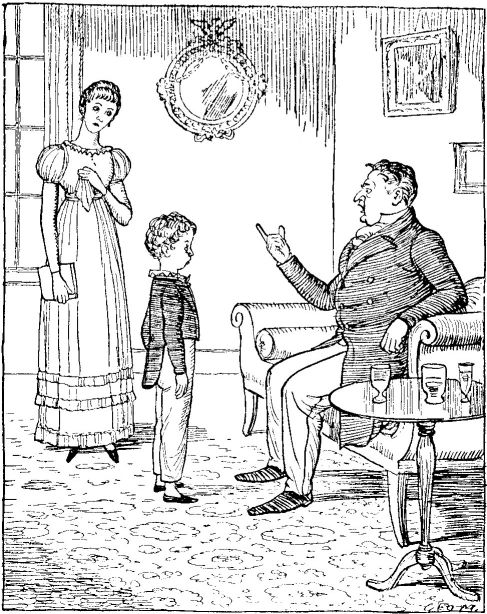
But a short time before this delicate recognition of the position accorded to her in Mr. Birdikin's family would have received nothing but grateful acknowledgment from Miss Smith. It has already been stated, however, that she had begun to show herself less submissive to his strictures than heretofore, and the reason for this must shortly be told.
Mrs. Clott, Miss Smith's maternal aunt, was desirous that her niece should pay her a long visit at the seaside town of X in order that a respite from duties which, however congenial to her, had already affected her health should restore her for another period of usefulness. When Miss Smith had said that she was treated with such consideration at Byron Grove that she was unwilling to incommode her generous patrons by leaving their service, Mrs. Clott had replied, with a directness of speech that had shocked her at the time, that Mr. and Mrs. Birdikin were taking advantage of her tractability to work her to death, and if she could not stand up to them she had better leave them altogether. After further conversation with her aunt, Miss Smith had promised that she would not permit herself to be 'put upon', as Mrs. Clott expressed it, any further; and she was now prepared to resist the censure that Mr. Birdikin was evidently preparing for her, while treating him with the respect to which he was entitled as her employer.
'I opine,' said Mr. Birdikin, when Henry had left the room, 'that the time has come to talk plainly, Miss Smith. I have observed in you of late a distinct deterioration both in behaviour and in morals, the former showing itself by your lately acquired habit of answering back when I have had occasion to address you in reprimand, the latter by such an example as has just been brought to light of a reprehensible laxity in the performance of the duties with which you are entrusted. I should not be fulfilling my own duty if I did not warn you in unmistakable terms that this cannot go on. This warning will be the last. If you do not mend your ways, Miss Smith, you can no longer remain at Byron Grove as a member of my household.'
Though aware of a trembling of her lower limbs, Miss Smith steeled herself against the severity of a man to whom she had always looked up with respect and even veneration. 'I think, sir,' she said, 'that you do me an injustice. But if you consider that I am no longer worthy of your confidence I should prefer to relinquish my position here.'
'And pray, Miss Smith,' inquired Mr. Birdikin, 'what do you propose to do to earn your living if you leave my employ under the cloud of my displeasure? Let me tell you that you would have small chance of gaining employment elsewhere, and none whatever in a family of such distinction as this.'
Miss Smith informed him of the offer made to her by her aunt. He heard her out with the courtesy he was accustomed to exercise towards his inferiors, but, when she had finished, could not forbear from expressing the indignation which her recital had aroused. 'And it is for this, Miss Smith,' he exclaimed, 'that you so lightly throw aside the patronage that has been so generously accorded to you? Can it be that under the protection of a Mrs. Clott you will not bitterly rue the benefits showered upon you here, in which no account has been taken of your indifferent birth and your family connection with a retail tradesman? Out upon such ingratitude, I say! It makes me wellnigh despair of human nature.'
This address reduced Miss Smith to tears, but she was unable to feel it wholly deserved, and a streak of obstinacy in her otherwise pliant disposition led her to leave Mr. Birdikin's presence with her departure from Byron Grove decided upon.
A happier turn, however, was to be given to this disturbance on the morrow, as will be recounted in the following chapter.
It has been recounted how Miss Smith, who had filled the position of governess at Byron Grove for three years past, had refused to accept Mr. Birdikin's censure upon what he had considered a lapse of duty on her part, and had given him notice of the severance of her engagement.
Upon the conclusion of the interview Mr. Birdikin, who was in a state of some heat at what he felt to have been an act of ingratitude on the part of Miss Smith for all the benefits he had showered upon her, sought out his helpmate and made her acquainted with what had happened.
Mrs. Birdikin usually saw eye to eye with her husband in what concerned the administration of their joint establishment, but in this instance she felt that he had intruded upon what was rightly a woman's sphere, and that if Miss Smith had so acted that her dismissal was called for it should have been left to herself to bring it about. But she thought from what he had told her that the governess was to be exonerated from having failed in her duty, and that he had not used his judgment rightly in visiting his displeasure upon her in the presence of one of her pupils.
'The fact is, Mr. Birdikin,' she said, 'that after your potations of last night you were not in a fit state to judge the rights and wrongs of an affair of this kind; and if you cannot dine out alone without exceeding your usual allowance of wine, which you are well aware has a deleterious effect upon your liver and kidneys, to say nothing of your head, I would recommend you for the future to take your dinner at home, where your wife can keep an eye on you.'
Mr. Birdikin, who had not yet recovered his customary poise, felt himself incapable for the moment of coping with strictures which he judged undeserved. Anxious to propitiate his wife, he said, 'But, my dear, I have not yet told you that Miss Smith has received an invitation from her aunt, Mrs. Clott, to take up her abode with her for a time, and is desirous of accepting it. It was my righteous indignation at so base a piece of ingratitude on her part as to wish to put herself under the protection of an ironmonger and his wife, instead of continuing to enjoy the patronage of such as ourselves, that led me to act as I am sure you would have acted if you had been brought face to face with such a situation.'
'I should have done nothing of the sort,' said Mrs. Birdikin. 'I have always found Miss Smith respectful in her manners and willing to oblige. A more experienced governess, to whom, I would remind you, you would pay twice the salary that contents Miss Smith, would not be willing to assist me in those household duties which my delicate state of health renders it inadvisable that I should perform myself. If Miss Smith leaves this house we shall not only have to engage another governess but, unless we are fortunate enough to secure a second Miss Smith, another maid.'
Mr. Birdikin, with that suppleness of mind which tempered his gifts of resolution and self-control, instantly divined the right course to be pursued. It was left for Mrs. Birdikin to interview Miss Smith and to persuade her, if persuasion were needed, to withdraw her notice and remain in her present position at Byron Grove.
In the meantime Miss Smith had informed her young pupils of her approaching departure; and so much had she endeared herself to them that their lamentations could only bring solace to a mind somewhat exacerbated by her late interview with her employer. Clara burst into tears, Charles vowed in high-spirited resolve that if Miss Smith left them he should run away, and Fanny incontinently set upon Henry, whom she accused of 'sneaking', and was not parted from him until she had scored his face with her nails and pulled out a lock of his hair.
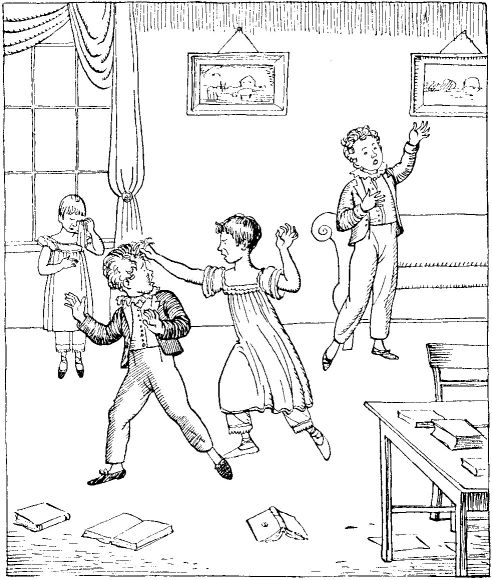
Such insubordination would normally have been dealt with severely by Mr. Birdikin, but he was disinclined for the physical exertion that chastisement would have involved, and told Henry, who made complaint to him, that if he could not contrive to make his manhood respected by his sisters he must abide the consequences. Mrs. Birdikin reprimanded Fanny for her unmaidenly attack, but when the latter said that she wished the damage to Henry's face had been still greater because of his driving Miss Smith away from them, she informed her that there had been a misapprehension and that she hoped that Miss Smith would be persuaded to stay.
This was repeated to the governess, who could not but be sensible of Mrs. Birdikin's condescension in mentioning persuasion where she was accustomed to command, though in this instance a command could not have been given.
It cannot be said what would have been the result of the parley between Mrs. Birdikin and Miss Smith if it had taken place earlier in the day. Mrs. Birdikin intimated that she required the attendance of the governess at a certain hour, and before that hour arrived Miss Smith had received a letter by the afternoon post which gave another turn to the circumstances.
Mrs. Birdikin received her reclining on a sofa, and showed in a gratifying manner that the interview was to be conducted with toleration on her part by requesting Miss Smith to take a seat instead of keeping her standing before her.
'I am persuaded, Miss Smith,' she said when the governess had seated herself, 'that your explanation was the true one, and that you were guilty of no such dereliction of duty as Mr. Birdikin somewhat hastily laid to your charge. It will be enough for you, I trust, if I express my regret that he should have misapprehended what was reported to him, and to request that you will withdraw the notice that I understand, in the perhaps natural heat of the moment, you gave him.'
'Indeed, madam,' said Miss Smith, 'it would ill become me to turn a deaf ear to such an appeal from one to whom I have always looked up with respect. But, acting on the advice of my kind aunt, I am proposing to take a month's holiday under her care, after which she is of opinion that I should take another situation elsewhere.'
This speech, which showed an amount of independence that Mrs. Birdikin was not accustomed to from the governess, was not pleasing to that lady. 'And pray where, Miss Smith,' she inquired, repeating the warning already given by Mr. Birdikin, 'do you expect to find a situation in a family so highly placed as this if you make application for it from the address of a woman who, however respectable, lives over a shop?'
'I have no need to make such an application, madam,' said Miss Smith. 'I have received a gracious letter from the Countess of Bellacre, who, in conversation with my aunt, learnt that I might be leaving your establishment, and now offers me the situation of governess to the Viscount Firebolt, the Lady Mary, and the Honourable John.'
To say that Mrs. Birdikin was surprised at this information would be to understate her feelings. She conveyed it at once to her husband, whose estimation of Miss Smith was advanced several degrees by this signal mark of esteem conferred upon her by his aristocratic neighbours.
Mr. Birdikin felt that Miss Smith must at all costs be dissuaded from transferring her valuable services from Byron Grove to Bellacre Castle. Accordingly he made a manly appeal to her not to throw upon him the onus of ruining the educational prospects of his innocent children by the necessity of finding another instructress, who could not be expected to possess the same high standard of scholastic attainment of which he was so conscious in herself. Learning from her the stipend offered by the Countess, and finding it more than double what he had paid her himself, he undertook to advance her emoluments to that figure. Mrs. Birdikin added her feminine appeal to his. She said that she had long been projecting a change from the attic that Miss Smith had occupied to a bedroom where she could have a fire should the inclemency of the weather require it, and intimated that for the future it would give her pleasure if the governess would take her meals with her young charges in the dining-room instead of having them served to her apart.
It is doubtful whether these tokens of an improved status, gratifying as they were, would have prevailed upon Miss Smith to forgo her project of resigning her office. But the entreaties of her pupils, who displayed an affection towards her which touched a heart by no means closed to the softer dictates of humanity, could not be ignored. She withdrew her notice of resignation, and it was arranged that, after a month's holiday under the care of her aunt, she should return to Byron Grove and take up again the duties which she had so well performed hitherto.
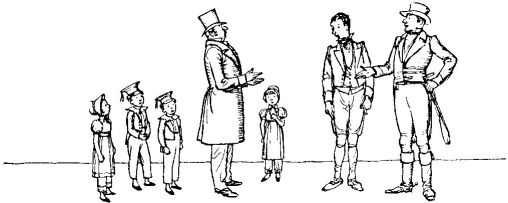
It was Mr. Birdikin's exemplary habit to examine from time to time those who were employed in his household in a menial capacity and to give them such moral instruction as he deemed fitting to those of an inferior order of intellect. He had always found the footman John ready and willing to profit by his instructions, though some lack of understanding on his part and an unretentive memory rendered it advisable that Mr. Birdikin should confine his lessons to the simpler duties incumbent upon him, such as a strict regard for the truth, diligence in his work, respect for his superiors, and gratitude for the benefits received at their hands. He also endeavoured to strengthen in the footman the powers of memory with which he was so poorly endowed by deducting a small sum from his wages every time he forgot something that he had been instructed to remember. But Mr. Birdikin well knew that punishment, though it might impress a necessary lesson on the mind, was less efficacious than self-discipline in such matters, and he had presented John with a little volume of moral poetry, from which he was directed to learn by heart a stanza every day, to be repeated to his master when the time for examination came round.
One morning when John was summoned into Mr. Birdikin's presence to show what progress he had made, he informed that gentleman with modest pride that he had got by heart an entire poem which had taken his immature fancy. It was entitled 'Feathered Prisoners', and began:
and in twelve lines of sprightly verse adjured the young readers for whom it was written to liberate any songsters which they might be keeping in captivity.
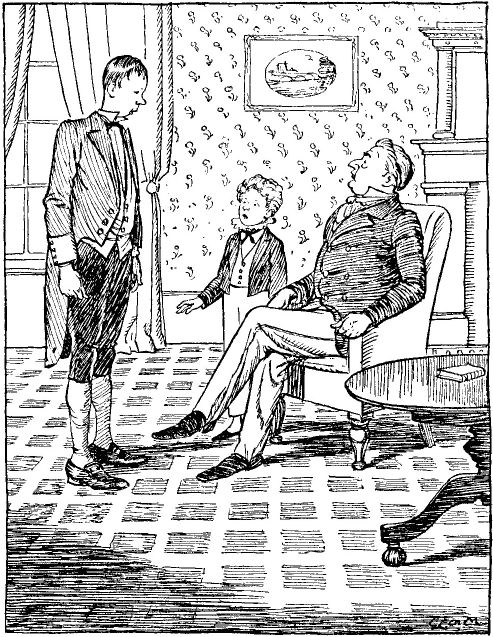
Except for the mispronunciation of the word 'empyrean', which occurred in the course of the poem, John acquitted himself well, and Mr. Birdikin commended him, but thought it necessary to point out that it would be of small benefit to set free song-birds in captivity, for they would be attacked and done to death by those who had always enjoyed their liberty. 'I was not aware,' he said, 'that that particular poem was included in the book with which I presented you.'
'Nor is it,' said Henry, who liked to be present when his father made examination of the servants. 'It is to be found in Little Rhymes for Little People, which belongs to me, and which I have lately missed from the place in which I was accustomed to keep it. It is not for me to dictate to my dear Papa, but I would suggest that he inquire from John how it came into his possession.'
The inquiry was made by Mr. Birdikin, but John, who was flurried by the question, could give no reasonable answer beyond saying that he thought he had found it in the waste-paper basket, which it was his duty to clear.
This reply was considered by Mr. Birdikin to be an evasion. 'I hesitate,' he said, 'to accuse you of having stolen the book, which you will at once return to its rightful owner, but my eye will be on you in the future. Look well to it that you do not stray from the strict path of rectitude, or punishment will be immediate and condign. Go! I am disappointed in you.'
A few days later Mrs. Birdikin missed a gold bracelet which she said she had taken off the night before and laid on her dressing-table. It was not surprising that Mr. Birdikin's suspicion should alight upon the footman, and he summoned him to his presence and accused him of the theft. 'For the sake of your hard-working and honest father and of your ailing mother,' he said, 'I will not give you into custody if instant restitution is made. But you can no longer remain in my service, and when the bracelet has been restored you must leave this house, not again to return to it. I have nourished a viper in my bosom. Not only do you appropriate a valuable piece of jewellery but you have the impudence to invade the privacy of a lady's chamber in order to do so. Bah! The ingratitude and dishonesty of the lower orders is enough to shake my confidence in the ordering of the universe.'
John burst into tears and vowed that he had not been near Mrs. Birdikin's bedchamber nor seen anything of the bracelet since she had worn it on her wrist the evening before. But Mr. Birdikin made short work of his protestations. 'I am convinced,' said he, 'that you are the thief. You will remain in your pantry while I have your room searched, and I warn you that unless you make instant confession I shall, as a magistrate, commit you to prison.'
Nothing was revealed by the search, but when it was over it was found that John had disappeared. Mr. Birdikin had taken the precaution of locking the door upon him, but he had escaped through the window. This confirmed Mr. Birdikin in the conviction that he was guilty, and he regretted that he had not had search made of the footman's person, for it now seemed probable that he had carried the bracelet away with him. It was unlikely, however, that he had run very far. His father was a woodman in the employ of Captain Rouseabout, and lived in a cottage on that gentleman's estate at no great distance from Byron Grove. Thither it was Mr. Birdikin's intention to repair when he had rested himself after the midday meal, together with his coachman, Bodger, and a stout lad from the stables, who would apprehend the footman and lodge him in the county jail.
It may be imagined that this disturbing episode was much discussed by the Birdikin children, who, since Miss Smith had left them for a time, were more in the company of their parents and of the servants than usual. With the exception of Henry, they refused to believe in John's culpability.
'It passes my comprehension,' said Charles, 'what he would want with Mama's bracelet, and I cannot believe that he is a thief.'
'I should have been loath to suspect him myself,' said Henry, 'but for his appropriation of my Little Rhymes for Little People.'
'You did leave that about,' said Fanny, 'and it may well have fallen into the waste-paper basket. I believe you stole Mama's bracelet yourself, and I wish you could be sent to prison for it.'
'Peace!' said Clara. 'Instead of disputing among ourselves, let us devise some means of removing the suspicion that lies upon John.'
The children then decided to make a thorough search for the bracelet, which was eventually found by Fanny in the upholstery of the sofa on which Mrs. Birdikin had reclined the evening before.
With a whoop of delight the children ran to their parents with their discovery. Mrs. Birdikin, while pleased to have the trinket restored to her, was not pleased at being convicted of an error of memory in stating that she had left it on her dressing-table, and Mr. Birdikin did not forbear from reprimanding her for a mistake that had led him unwittingly to do an injustice to an honest and willing lad. 'Though not accommodated with any marked degree of intelligence,' he said, 'John is none the less a valuable servant, and is paid a lower wage than would be demanded by one of a higher degree of sagacity. I should be sorry to lose him, and fortunately there is now no necessity that we should do so. I will repair this afternoon to the cottage of John's father, as already arranged, but without Bodger and Thomas, and intimate to John that he is restored to my favour, and that nothing further will be said about his leaving the house without my permission.'
'There speaks my generous and high-minded husband,' said Mrs. Birdikin; and Mr. Birdikin glowed with the sense of rectitude and benevolence, and himself undertook to have the clasp of his wife's bracelet repaired so that it should not again fall from her wrist.
The children accompanied their father to the lowly cot in which John's parents resided, anticipating with pleasure his exoneration from the charge unjustly, as it turned out, preferred against him. Arrived there, they saw a horse tethered to the gatepost, and emerging from the cottage John, still in his footman's livery, and Captain Rouseabout, whose general reputation as a man of dubious habits and speech had long since alienated from him the regard of his upright and high-minded neighbour.
Mr. Birdikin was in no mind to parley with this man, whom he regarded as a reprobate, but Captain Rouseabout instantly called out to him, 'Here you, Birdikin, what do you mean by locking up an innocent lad? I'll have you turned off the Bench for it. I'll bring an action for false imprisonment against you.'
Though greatly disliking the necessity of explaining himself to a man so lost to all sense of propriety as to address him thus before his children and a menial, Mr. Birdikin could not but express his regret at the error that had led him to act as he had done. 'I shall make what amends are called for,' he said, 'by taking John back into my service, and if his behaviour remains good may even consider giving him a rise of wages on next quarter-day.'
'No, you won't,' said Captain Rouseabout rudely. 'I have taken John into my service, and he's well rid of you. Get off my ground, and take your brats with you.'
Mr. Birdikin was about to retire, with that dignity which never forsook him under the most trying conditions, when Captain Rouseabout's eye lighted upon Fanny, whom he had come across on an occasion already recounted. 'Hallo, my little dear!' he said. 'Want another ride on my horse?'
But Mr. Birdikin had already turned his back upon him, his children obediently following. Fanny, however, turned round and smiled at Captain Rouseabout. Fortunately for her this was not observed by Mr. Birdikin, who forbade his children, under pain of severe bodily chastisement, from ever mentioning the name of Captain Rouseabout or of John again.
During the absence of Miss Smith, who was visiting her aunt, Mrs. Clott, at the seaside town of X, the Birdikin children, owing to the lack of guidance in their hours of recreation, were apt to run into mischief, and the switch, birch, or strap with which Mr. Birdikin enforced upon them the necessity of propriety of conduct was more often called into play than before. To spare the rod and spoil the child was no part of a parent's duty as he saw it, but it cannot be doubted that bodily punishment, while efficacious in keeping some upon the straight path, with others serves only to aggravate the offence it is designed to remove. The intractability of disposition shown, for instance, by Fanny was not to be softened by such chastisement, and, although the opinion of Bodger, the coachman, that she was a 'limb of Satan', may be taken as an exaggeration, the more she was beaten the more her unruliness increased.
One afternoon when Mr. and Mrs. Birdikin had driven out in the family chariot, the four children found themselves in their father's study. Upon a table were displayed twelve copies of a local news-sheet, which contained a portrait of Mr. Birdikin in his character of magistrate and member of the County Road Board, and it occurred to Henry to dare his sister to write under one of them, 'Silly old Birdikin'.
Fanny instantly accepted the challenge, seized a quill from the writing-table, and inscribed the insulting words upon the paper.
'There!' she said. 'Now my Papa will know what I think of him, and if he says anything about it I shall tell him that you told me to do it.'
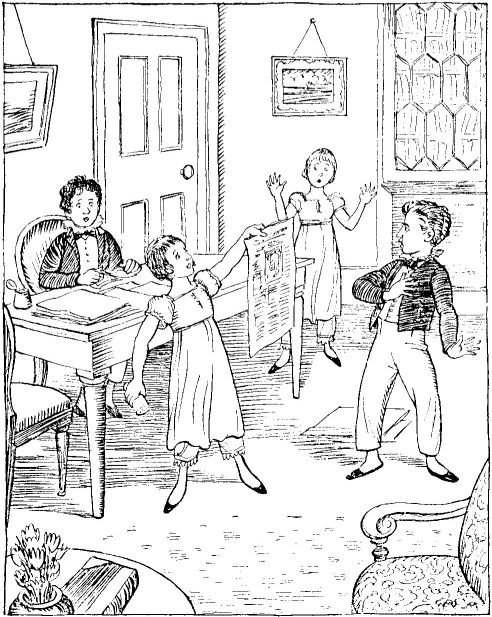
Henry, who was horrified at the sight of the offending words, vowed that he had had no idea of his challenge being accepted; but Fanny, who had been sprinkling sand upon the wet ink, threw the china dredger at him and ran from the room.
It was agreed between the other three that the best way of keeping the outrage from their father's observation would be to abstract the copy of the paper and trust that it would not be noticed. But Mr. Birdikin had already decided to whom the copies were to be sent, and when he discovered that there were only eleven where before he had counted twelve it was not long before the truth was elicited and he saw with his own eyes the obnoxious inscription for which a child of his had been responsible.
It was not to be wondered at that punishment was immediate and condign. All four children shared in it, but Fanny received the first and most severe beating while Mr. Birdikin's vigour was still fresh and his indignation warm. Her wrigglings prevented the full force of his strokes impinging upon that part of her body towards which they were directed; but her punishment was a heavy one, and, instead of being brought to contrition by it, she made the announcement through the tears which followed that she should go instantly to Captain Rouseabout and ask him to take a horse-whip to her father.
Such an idea, entering the mind of a child of no more than nine years of age, could only be taken as a sign of deeply-rooted depravity. Fanny was sent to bed while Mr. Birdikin exercised his suppleness of wrist upon the other three children. When this correction had been administered and they had retired from the room howling, he consulted with Mrs. Birdikin on what further steps were to be taken to bring Fanny to a state of contrition for the enormities she had committed. Mrs. Birdikin recommended reasoning with her, and her husband was willing to try that course; but upon entering Fanny's bedchamber he found it empty, and subsequent inquiries elicited the fact that she was nowhere to be found. Fanny had added to the iniquities with which her cup was already full by running away.
It was hardly to be believed that she had fulfilled her threat of going to Beechcroft, the residence of Captain Rouseabout; for Mr. Birdikin had no dealings with his disreputable neighbour and judged that Fanny had brought in his name simply for the sake of the additional naughtiness involved in doing so. When no inquiries, however, brought any report of her having been seen, he dispatched a groom to Beechcroft to make inquiries, who returned with the information that nothing had been heard or seen of Fanny in that direction, but informed his master that Captain Rouseabout had said that he should be pleased to see the little lady at any time.
This seriously annoyed Mr. Birdikin; but his vexation was presently absorbed in the anxiety which Fanny's flight was beginning to cause him. For it was nearly three hours since she had been missed; and with gipsies and other bad characters known to be in the vicinity the escapade was seen to involve serious danger to the child's safety.
But Fanny was fortunately in safe hands. Exasperated by what she considered her father's injustice, she had set out to walk the six miles that lay between her home and the town of X, where she designed to seek consolation from Miss Smith. It was a long distance for a child to travel, and she arrived footsore and weary, but without having suffered molestation by the way. The fatigue she had undergone had reduced her childish irritation, and when she had been given refreshment and a hot bath by kind Mrs. Clott, who was shocked to find on her body bruises caused by what she regarded as Mr. Birdikin's brutality, she was none the worse for her adventure.
In the meantime anxiety on her behalf had reached fever point at Byron Grove; but just as Mr. Birdikin had decided to rouse the countryside and to have bills printed with a description of the missing child, a mail phaeton drove up to the door, which contained Captain Rouseabout, Miss Smith, and Fanny. Miss Smith and Fanny alighted and entered the house. Captain Rouseabout, who had given Fanny a smacking farewell kiss, called out to Miss Smith, 'Now don't be long, Sally. I don't want to keep the horses standing'.
These remarks were overheard by Mr. Birdikin, who could scarcely believe his ears at such an address to the governess, whose name, as he was aware, was Harriet. Miss Smith, however, did not appear to be outraged by the impertinence, but said to him, 'I have brought the child back, Sir, and should wish to have a short word with you apart before I return to my aunt'.
Mr. Birdikin led the way into his room, where Miss Smith addressed him thus: 'I think it is time, Sir, that you refrained from lifting your hand against your girl children, and if I am to return to you in the capacity of governess I should wish to make the stipulation that you shall do so'.
Mr. Birdikin was so taken aback by this change of attitude on the part of Miss Smith, who but a short time before would never have thought of venturing upon any criticism of him, that he could only stammer out that with Miss Smith once more installed at Byron Grove it was to be expected that the behaviour of the children would be such as to call for no further chastisement from him.
Miss Smith bowed her head. 'I will charge myself,' she said, 'with their good behaviour. Children are to be ruled by affection, Mr. Birdikin, and not by terror. You and Mrs. Birdikin must have suffered distress by Fanny's long absence, and I have no wish to add to it. But had it not been for Captain Rouseabout's kindness in tracking Fanny to my aunt's establishment and offering to drive us back here, you would still have been without news of your child. Let this, I pray, be a lesson to you. I will stay no longer, but wish you good evening.'
She left the room with an assured step that Mr. Birdikin did not recognize as belonging to the Miss Smith whom he had hitherto known, and he saw her from the window mount up beside Captain Rouseabout, who drove rapidly away.
After a pause of bewilderment, Mr. Birdikin sought his wife and expressed to her his doubts of Miss Smith's sanity. 'She to lecture me,' he exclaimed, 'to whom she owes everything! And to adventure herself alone with that boor! What is the world coming to? I shall not leave the matter as it is.'
'Miss Smith is quite right,' said Mrs. Birdikin. 'My apprehension now is that the news of your beating your daughter as if she were a dog or a menial will spread to our neighbours. You had better call on Captain Rouseabout to-morrow, Mr. Birdikin, and assure him that it is the last time it will happen. He is not so bad as you have always made him out to be, and is quite well thought of by the Earl and Countess. And I would point out to you that you would do well to show discretion in this matter, unless you wish to have it noised abroad that your own children have no greater respect for you than to dub you "Silly old Birdikin".'
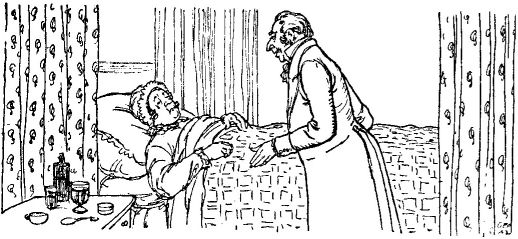
Mrs. Birdikin's maternal uncle, the Lord Bishop of P——chester, had announced his intention of visiting his relatives during a tour of inspection of his diocese, and it may be imagined that the prospect of entertaining so illustrious a guest gave not a little pleasure to the inhabitants of Byron Grove. By an unfortunate concatenation of affairs, however, the visit of the Bishop happened to coincide with that of Mr. Birdikin's Aunt Maria, whose worldly circumstances made it advisable to welcome her from time to time to his mansion, but in whom a certain commonness of behaviour made it inexpedient to present her to those with whom he wished to stand well. It was not possible to ask Mrs. Purport to cut short her visit, for she was pleased with the prospect of meeting the Bishop, and had she guessed that her absence would be preferred to her society during his sojourn at Byron Grove she would certainly have taken umbrage and might well have visited her displeasure upon her nephew by cutting him and his family out of her will. What then was to be done about it?
A solution of the difficulty occurred to Mr. Birdikin when it came to his remembrance that on a former visit of Aunt Maria's she had indulged to such an extent in a dish of dressed lobster that she had been forced to retire to her bedchamber in considerable discomfort of body, and it had been necessary to call in Dr. Affable to administer the treatment that would restore her to health. This had been of a drastic nature, and the good lady had vowed that she would not again partake of the succulent dish which had caused her such discomfort. A year or more, however, had elapsed since this occurrence, and Mr. Birdikin's expectations were encouraged when a dish of lobster had appeared on the luncheon-table on the day before his Lordship's arrival, and Mrs. Purport, so far from refusing it, made the inelegant remark that it was worth the risk of a belly-ache and indulged in two of the large helpings which he hospitably pressed on her.
The result was gratifying to him as the prospective host of a man of high standing if not as that of a fond nephew. Aunt Maria was taken exceedingly ill and retired to bed. Dr. Affable was summoned and pronounced it impossible for her to leave her chamber for at least two days; and the way was clear for the unencumbered entertainment of the Bishop.
The problem of Aunt Maria thus disposed of, a further complication was introduced by a letter received from the Bishop's chaplain on the morning of his arrival. This gentleman wrote that, as an undergraduate of the University of Oxford, his Lordship had had a close personal friend in a gentleman of the name of Rouseabout, and that he had lately heard that this gentleman's son was resident in the neighbourhood of Byron Grove. He made the request that Captain Rouseabout might be invited to dine, so that he could make his acquaintance, and Mr. Birdikin did not feel himself at liberty to refuse this request, although his opinion of his neighbour was such that he considered him the last person in the world who was fit to be introduced to the society of a pillar of the Church. The responsibility, however, was upon his Lordship, and if Captain Rouseabout should offend his father's old friend by any coarseness of speech or behaviour Mr. Birdikin would absolve himself by informing the Bishop that he should not darken his doors again. A note was sent to Beechcroft by a mounted groom, who returned with a reply from Captain Rouseabout to the effect that bishops were not much in his line as stable companions, but as he had heard that this one had been a sporting cove in his youth he should be glad to take his oats in his company that evening and put him on to something good for the St. Leger.
The Bishop's chariot drove up early in the afternoon, and his Lordship, who was possessed of a benign and fatherly spirit, intimated that it would give him pleasure to make the better acquaintance of his great-nephews and nieces. Using a colloquial expression more indicative of the man than of the prelate, he said with a kindly smile that he would like to 'stretch his legs' after his long drive, and requested that the children should take him round the garden. This they did, accompanied by Miss Smith and the chaplain, who, however, did not intrude upon their conversation but found subjects of their own, which interested them so much that they presently turned into a shrubbery path and were lost to view. Observing this from the window of the house, Mr. Birdikin remarked that Miss Smith was inclined to forget the subordinate position which she held in the household; but Mrs. Birdikin opined that in view of the chaplain's sacred profession it was unlikely that he would take advantage of the occasion to press unwelcome attentions upon the governess, but that if he did so she could be trusted to reject them.
The eminent but benign ecclesiastic soon got upon terms with his young relatives. Henry, who, in view of his future profession, was desirous of impressing himself upon his august kinsman, offered to repeat the Church Catechism to him; but his Lordship intimated that he was already familiar with it and should prefer to visit the stables. Here he was shown Charles's pony, and gained the respect of Bodger, the coachman, by his knowledge of horseflesh. So completely did he gain the confidence of the children that Fanny informed him that it was her intention when she attained maturity to become a circus-rider, and he did not rebuke the childish folly of the remark but told her that he should prefer to see her a good wife and mother. This led Charles to the disclosure that she had expressed a wish to affiance herself to Captain Rouseabout, and Henry thought it advisable to intimate that that gentleman was considered by his father to exercise a deleterious influence upon the neighbourhood. The Bishop made no remark upon this; but when Fanny said she had given up the idea of marrying Captain Rouseabout because she thought he was in love with Miss Smith he gently rebuked the children for making free with the names of their elders.
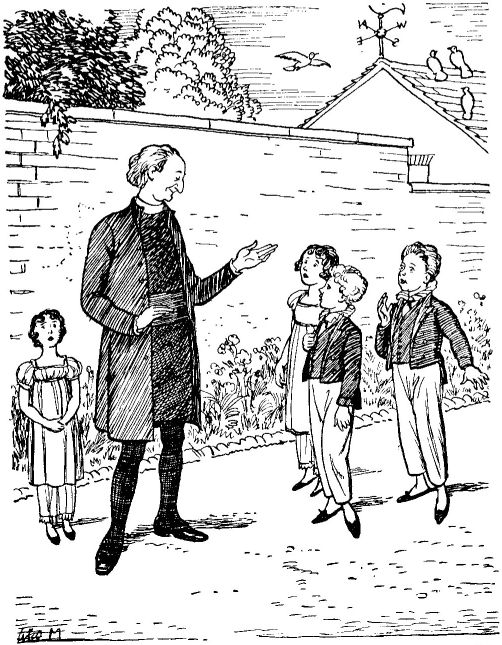
With his habitual forethought for the just claims of others, Mr. Birdikin had invited to his board Mr. Guff, the curate-in-charge, and his consort; and with three clergymen present he hoped that Captain Rouseabout, whose habitual talk reeked of the stable and the cockpit, would be kept in check. That gentleman, however, was by no means to be reduced to silence in whatever company he might find himself, and it was left to Miss Smith, who sat between him and the chaplain, to keep his talk within the bounds of propriety. This she did with a resource for which her employers had not given her credit; but Mr. Birdikin experienced some sense of outrage at her taking so much upon herself, and once or twice intimated to her, by taking the conversation out of her hands, that a modest silence would better have befitted her position in his establishment.
The warm summer evening made it agreeable for the gentlemen to drink their wine on the terrace after dinner; but what was Mr. Birdikin's surprise when only three bottles of port wine had gone the rounds to see both Captain Rouseabout and the chaplain rise from their seats and betake themselves to a corner of the garden in which a white dress could be seen glimmering among the trees. The wearer was undoubtedly Miss Smith, but before he could express himself upon the enormity of her behaviour in thus inviting the attentions of two of his male guests the Bishop said with a paternal chuckle, 'The red coat and the black! Which has a better chance with the fair lady?'
Before he could recover himself a window immediately above the place in which they were sitting was thrown open and a somewhat strident voice was heard saying, 'Zephaniah Birdikin, introduce me to the bish'.
It was Aunt Maria, who, somewhat recovered from her indisposition and not wishing to be left out of the sociability that was going forward, had taken this opportunity of presenting herself. Mr. Birdikin could have sunk into the ground with shame when he saw his relative, whose very presence in the house he had forgotten, standing smirking at the window in a large night-cap. He was forced to make the introduction, which his Lordship acknowledged courteously, recommending Mrs. Purport not to risk her health by further exposure to the evening air, and the disturbing episode was over. Another bottle of port wine was opened and praised by the Bishop, who was pleased to remark that his reception and entertainment at Byron Grove had exceeded his expectations.
The Rectorate of H——, the parish in which Byron Grove was situated, was in the gift of the Bishop of P——chester, Mrs. Birdikin's maternal uncle. It had been held for some years by a gentleman who, in consequence of overspending the considerable income attached to it, had been forced to escape his creditors by taking up his residence in the town of Boulogne. The greater part of his emoluments he had retained for himself, but had paid Mr. Guff, the curate, eighty pounds per annum, and given him the use of the Rectory, so that the morality of the parish did not suffer from his absence, though Mr. Birdikin was apt to deplore that its ministrations were in the hands of a poor curate instead of those of a well-endowed incumbent, whom he could meet upon equal terms. He cherished, however, a hope that Henry, when he should arrive at a canonical age, might be preferred to the living, which would give him a satisfactory provision for life; and it was consequently with some annoyance that he received the news, not long after the Bishop's visit to Byron Grove, that the Rector of H—— had succumbed to a low fever.
The days were long since past when a child of eleven could be preferred to a valuable living, and Mr. Birdikin was inclined to regret them, but reflected that it was still not unknown that what was called a warming-pan should be installed in an incumbency, and hoped that the Bishop would present a man of advanced age, whose demise might be expected by the time that Henry would be ready to step into his shoes.
Mr. Birdikin did not feel justified in making this proposal to his august relative, but caused his wife to write to her uncle, enclosing some moral reflections composed by Henry under his direction, and saying that it was the ardent wish of his parents that when the time came they would see their beloved younger son responsible for the behaviour of the parishioners of H——, as their elder would take his father's place in respect of their material welfare.
A few days later the curate's children, Thomas and Lucy, were invited to spend the afternoon with the young Birdikins, and after indulging in various games and sports of an active nature collected in one of the arbours that diversified the grounds of Byron Grove and entered into childish conversation.
'I fear,' said Charles, 'that these diversions with our young friends will soon be coming to an end. It may be that the new rector will have children with whom we can play, but they cannot take the place of Thomas and Lucy in our estimation.'
'Well said, Charles,' commented Clara. 'It will be a sad day when our playmates leave us.'
'Has your papa succeeded in obtaining employment elsewhere?' inquired Henry. 'I apprehend that at his age and with his lack of interest he could hardly expect to better his situation, but it is to be hoped that he will obtain a curacy upon which he and his family can continue to subsist.'
'Thank you for nothing,' replied Thomas. 'My Papa is himself to be the new Rector of H——, and will buy me a pony.'
'Indeed, Thomas,' said his sister, 'you should not indulge your propensity to brag. My Papa only hopes that he may be preferred to the incumbency.'
This admission caused Henry to break into a rude laugh. 'That would indeed be an appointment to create mirth,' he said. 'Your Papa, though pious and well-meaning, is neither of birth nor position to be preferred to a living which there is every reason to believe will be given to one who will keep it warm for me.'
Thomas did not wait to reflect upon this utterance, but gave Henry a violent blow upon the face, which was returned, and the two boys were immediately involved in a fierce bout of fisticuffs. This was cheered on by Charles and Fanny, but caused Clara and Lucy to run to summon Miss Smith, who had left the children to play alone, at Mrs. Birdikin's request, in order that she might assist that lady in various household duties.
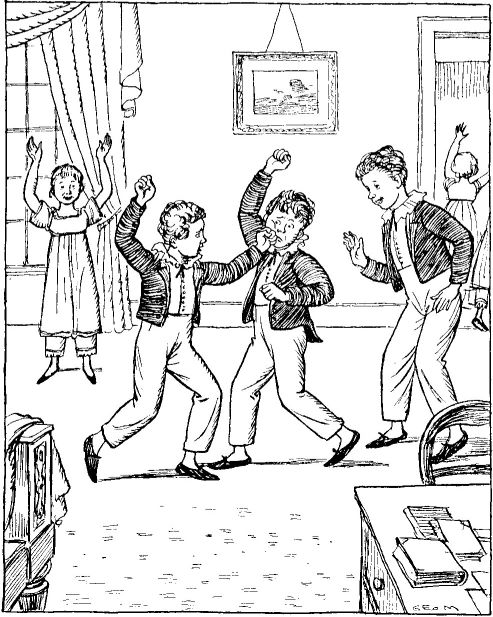
When the governess arrived upon the scene the physical contest was over. Thomas, though younger and shorter than Henry, had more stomach for a fight than the lad whose footsteps were destined to follow the paths of Peace. Henry was bleeding at the nose and one of his eyes was closed, but he was still engaged in wordy warfare with his late adversary, and vowing that he would get him punished for his unprovoked assault.
Miss Smith, who had a considerable influence over all the children, would no doubt have composed the quarrel, but Mr. Birdikin had seen her running out, and, intercepting Clara and Lucy, had gained knowledge of the dispute from them. He now arrived on the scene and expressed himself strongly to Thomas for his breach of decorum. 'Am I never to have an end of your graceless behaviour?' he inquired. 'Cannot I extend hospitality to the children of a worthy though unbeneficed official of the Church without inviting a display of coarseness and violence?'
Thomas hung his head, but Fanny spoke up for him. 'It was Henry who invited the attack, Papa,' she said. 'He twitted Thomas with the inferiority of his parent.'
'He had boasted that Mr. Guff was to be made Rector of H——,' said Henry, 'and I merely remarked that such an appointment would be unfitting, when he fell upon me violently.'
'I have told you before,' said his father, 'that I will not have you twitting or quizzing our good curate's children on the poverty or inferiority of their parents. And I would say to you, Thomas, that it ill becomes you, who are received here as if you were the equal of my own children, to vaunt an expectation that cannot possibly be fulfilled.'
'Why should not Mr. Guff be made Rector of H——?' inquired Fanny. 'I shall write to my uncle and beg him to present him with the living.'
Mr. Birdikin would have dealt suitably with this interposition, but he was forestalled by Miss Smith, who said, 'What is entirely unfitting is that children of your age should be discussing matters which are the province of your elders. Run along now and engage in the play that becomes your years and I will shortly join you.'
The children, glad to be relieved from a further show of displeasure from Mr. Birdikin, immediately ran out, and Miss Smith was left alone with her employer, to whom she said, 'I opine, Mr. Birdikin, that there has been far too much talk before the children of the emoluments attached to the clerical profession, of which they would otherwise know nothing. Would it not be better to give them the idea that his Lordship will be guided by the character of the clergyman whom he will present to this living rather than by his worldly circumstances?'
'Miss Smith,' said Mr. Birdikin, bending his brows upon her, 'you have been much inclined of late to express your opinion upon matters which are not within your province. I will request you to bear in mind the duties you are called upon to fulfil in my household and to refrain in future from interfering in matters which are no concern of yours and with which you are incompetent to deal. Let me also tell you that in this instance to encourage Mr. Guff in any ideas he may cherish in connection with this incumbency is to do him an ill service, which can only result in disappointment and confusion to a man who, however worthy in his own lowly sphere, is no more likely to be made Rector of H—— than Archbishop of Canterbury or Pope of Rome.'
'I have reason to believe, Mr. Birdikin,' replied Miss Smith, preparing to leave him, 'that you are mistaken, and that you will shortly receive the news that Mr. Guff has been appointed Rector of H——.'
And so it turned out. That very evening Mr. Guff called upon Mr. Birdikin and informed him that the Bishop had been pleased to appoint him Rector of H——. 'It is no doubt owing to your kindness in inviting me to meet the Bishop during his sojourn under your hospitable roof that I owe this preferment,' he said. 'Had I not had the privilege of personal intercourse with his Lordship and made a friend at court in the person of Mr. Speedway, his chaplain, I doubt if it would have come my way.'
Though surprised and somewhat chagrined by the turn that events had taken, Mr. Birdikin was quick to reflect that, as the appointment was now an accomplished fact, it behoved him to show nothing but pleasure in it. 'I am rejoiced, Mr. Guff,' he said, 'that I have been able to serve you in a way that can only bring gratification to all concerned. You may well imagine that any advice I may have been called upon to give as chief landowner in the parish of H—— could only have been directed towards procuring for you the position you are so eminently fitted to fill, and anything I may have said while the question was still in abeyance was dictated by my unwillingness to betray whatever confidence there may have been between my illustrious relative and myself.'
Mrs. Birdikin coming in at that moment, the news was imparted to her, and she also congratulated Mr. Guff upon his appointment, which she opined was owing to her relationship with his patron. When the Rector-elect had left them they resumed a conversation which had taken place before his arrival, in which it had been a matter of conjecture between them what information Miss Smith could have gained which had led her, as it were, to prophesy what had since come to pass.
'It is now clear to me,' said Mr. Birdikin, 'that she has been in correspondence with Mr. Speedway, your uncle's chaplain. The indelicacy of such a proceeding——'
But Mrs. Birdikin cut him short. 'You have already complicated matters,' she said, 'by announcing that Mr. Guff was not a suitable person for the position which has now been conferred upon him. Do not, I beseech you, bring ridicule upon yourself by interfering in what is none of your concern. At the present moment Miss Smith is a governess, but she may not long remain so. Keep your eyes and ears open and your mouth shut, Mr. Birdikin, and refrain, if I may use the expression, from making a further fool of yourself.'
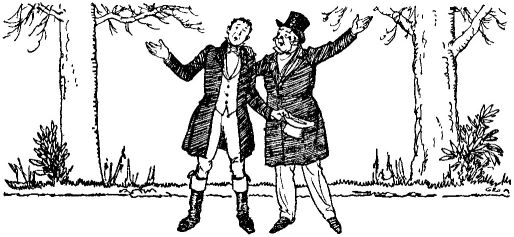
Mr. Birdikin was not himself addicted to the pleasures of the chase, but he judged that foxhunting was the legitimate sport of the English gentry, and to be encouraged by all those to whom Providence had assigned a situation of superiority, such as he himself enjoyed. Consequently when the Earl of Bellacre, as Master of the West M——shire hunt, sent him an invitation to join a party of foxhunters at dinner he was pleased to accept, and caused himself to be driven over to Bellacre Castle with anticipations of a pleasant evening before him.
The noble host set before his guests a dinner in which fish, flesh, and fowl were abundantly represented, and provided an assortment of wines and other alcoholic beverages to which those present did full justice. The later proceedings of the evening were enlivened with song, and it was not until a late hour that the party broke up. But when it did so Mr. Birdikin was informed that his coachman, Bodger, was not in a fit state to drive him home, being at the moment in a recumbent position under the table of the servants' hall, at which he had partaken too freely of the potables so generously provided.
Mr. Birdikin was rescued from what might have been an awkward predicament by Captain Rouseabout, who offered to drive him home in his dog-cart; and, although his opinion of his neighbour was a low one, a certain mellowness which had been induced in him by the good cheer he had enjoyed led him to fall upon Captain Rouseabout's neck and inform him with tears that he was his life's preserver.
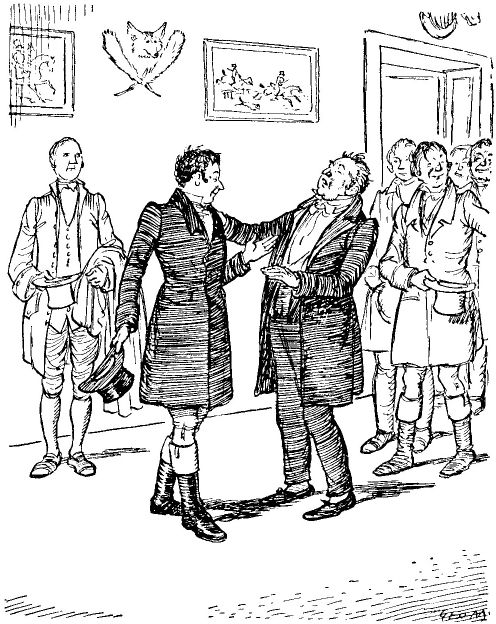
He was helped to his seat in the high dog-cart by Captain Rouseabout and his groom, while a stableman held the horse's head. All three of them were unfortunately in a state of imperfect sobriety, and made hilarious remarks at Mr. Birdikin's expense, which at another time he might have resented. But, as he chanced to knock the groom's hat off his head as he was hoisted up, he was so overcome with laughter himself at the absurdity of this accident that he nearly fell from his seat, and Captain Rouseabout, opining that he was also, as he was pleased to express it, 'bosky', judged it desirable to strap him into it.
This operation occupied some time and at first amused Mr. Birdikin excessively, but upon feeling the strap tightened around his body he burst into tears and begged Captain Rouseabout to have pity on his wife and innocent children.
They drove off, and, although Captain Rouseabout was still under the influence of his too copious libations, his life-long skill with the reins prevented greater divagations from a straight course than if he had been walking along the road. The journey was cheered by song, in which Mr. Birdikin, having recovered from the momentary drop in his spirits, joined with the full force of his lungs, for he had a powerful and pleasing baritone voice, and informed Captain Rouseabout after a burst of melody that the excellence of his singing had made such an impression upon Mrs. Birdikin in her girlhood that she had consented to make him the happy man that he now was.
They were by this time approaching Byron Grove, and the confidence that had been imparted to him gave Captain Rouseabout the idea of serenading the ladies of the house. Mr. Birdikin was pleased to fall in with this suggestion, but, thinking that Mrs. Birdikin might prefer to hear his voice alone raised under her window, rather than have it mixed with the more raucous strains from Captain Rouseabout's throat, was relieved by a further suggestion from that gentleman that he should direct his melodious attentions to Miss Smith. He could not at the moment call to mind the chamber in which the governess was reposing; but reflecting that Captain Rouseabout would be even more ignorant of its whereabouts, directed him to a window round the corner of the house, and returned to take his stand under the casement of his consort.
At this moment the front door was thrown open, and Miggs, the butler, who had lately taken the place of the footman, John, in Mr. Birdikin's establishment, appeared on the threshold, having waited up to admit his master.
At the sight of him it occurred to Mr. Birdikin that any vocal tribute he might wish to pay his wife would be more comfortably and conveniently addressed to her in their marital chamber than from the carriage-drive at three o'clock on a winter night; and then it came to his recollection that Mrs. Birdikin had left home that morning on a few days' visit. He prepared to enter his mansion. As he did so the frosty air was split by a loud 'View-halloo', with which Captain Rouseabout was calling attention to the more musical efforts with which he designed to follow it, and there ensued a lugubrious wailing which represented his ideas of music as adapted to the expression of love.
Mr. Birdikin was instantly struck with the gross impropriety of a man of Captain Rouseabout's character affronting the sanctities of his home by those cacophonous strains. He dispatched Miggs post-haste to bid him begone, and, feeling the need of repose for himself, began to doff his habiliments, under the impression that he had already reached the seclusion of his bedchamber.
The lateness of the hour at which he had retired to rest caused Mr. Birdikin to pretermit his invariable custom of appearing at the breakfast-table and encouraging his children by precept and maxim to engage cheerfully upon the duties that lay before them. Though still far from having completed the span of life allotted to mankind by the Psalmist, he had reached that age at which divergence from habit carries a penalty with it, and he awoke with a headache, which inclined him to a view of life the reverse of rosy. So strong, however, was his sense of duty that he arose, shaved and dressed himself with his usual nice sense of what was due to a man of his standing, went downstairs, and, learning that Bodger, the coachman, had returned, caused him to be summoned to his presence.
The interview was a short one. Mr. Birdikin was not in the mood to listen to excuses from his servant, and, in his then state of debility, was wishful of a further period of repose. He pointed out to the coachman the enormity of yielding to the temptations of insobriety, and told him plainly that any further lapse on his part would lead to his instant dismissal. Bodger, subdued in spirit, left him, and he locked the door of his room and extended himself upon a couch.
Refreshed by a morning spent in slumber, he appeared at the luncheon-table ready to take his leading part in the intercourse with which these family meals were enlivened, and was immediately called upon to settle a dispute that had arisen between the children.
Fanny had declared that she had been awakened in the middle of the night by the sound of the waits, and the others had said that as it was not yet the season for their visits she must have been overtaken by a nightmare.
Mr. Birdikin endorsed this opinion, but Fanny still declared that she had heard the strains of 'The Mistletoe Bough' before she had fallen asleep again. Mr. Birdikin rebuked her for obstinacy, and bade the children consume the rest of their meal in silence.
After luncheon Miss Smith begged for a few minutes' conversation with her employer, and when she had accompanied him to his room, she said, 'Mr. Birdikin, you have submitted me to insult, and I must demand an apology from you, or I shall inform Mrs. Birdikin, when she returns home, that I cannot remain a member of your household'.
Mr. Birdikin was greatly taken aback by this address from a dependant upon his bounty, and inquired of Miss Smith in what way she considered him to have submitted her to insult.
'It was not the waits, sir, that Fanny heard last night,' she replied, 'but the voice of a person to whom you yourself shouted out, "That's her room. Give it tongue". I was awake and recognized your voice.'
Mr. Birdikin had no recollection of having used the words quoted, but hastened to inform her that it was Captain Rouseabout who had driven him home, he feared in a slight state of intoxication, and expressed a wish to serenade Miss Smith, that he had thought the attention would not be displeasing to her, and had permitted it as a means of getting quit of Captain Rouseabout. If he had unwittingly offended her he would express his regrets, and begged that she would not bring the episode to the notice of Mrs. Birdikin.
Miss Smith accepted the apology and gave the required undertaking. When she had left him Mr. Birdikin again took to his couch, relieved in his mind that the disturbances attendant upon the Hunt Dinner were now at an end.
Mr. Birdikin had received his education at Dr. Thwackem's Select Academy for Young Gentlemen at Clapham, and it was intended that Charles and Henry should repair to the same establishment in due course, for the excellent Doctor, though now advanced in years, was still vigorous both of brain and hand, and accepted none but the sons of gentlemen of assured standing to whom to impart such instruction as was befitting for those whom Providence had raised above the vulgar herd.
The approaching departure of Charles and Henry to what Mr. Birdikin, with pretty conceit, was pleased to refer to as the Groves of Academe, formed the subject of conversation one morning at the breakfast-table, and Mr. Birdikin, with a courteous inclination of the head towards Miss Smith, remarked: 'My sons, I doubt not, will be second to none in the excellence of the instruction they have received before entering upon their scholastic course, and I trust they will do credit to the attention paid not alone to their mental but also to their moral welfare by so excellent an instructress as Miss Smith'.
Miss Smith, gratified at this tribute from her employer, replied, 'Indeed, sir, my task has been made easy by the high moral standard maintained in this household, but Charles and Henry are now getting beyond the tutelage of a female, and their studies will be better directed by the learned Dr. Thwackem and his accomplished staff than by my humble self'.
'Why cannot my brothers be sent to Eton College,' inquired Fanny, 'where the Firebolts are going next half? I am informed by them that Dr. Keate once flogged eighty boys in a morning.'
'The necessity for occasional chastisement of unruly spirits is not the only requirement of a sound education, Fanny,' replied Mr. Birdikin. 'The Viscount Firebolt and the Honourable John will repair to Eton College as the sons of my good neighbour the Earl of Bellacre. For my sons, a more modest and, I may add, a less costly seminary will suffice for the inculcation of those principles of gentility in which I was nurtured myself.'
'Tommy Guff is going to Eton,' said Fanny, 'and is to ride over on his pony every morning to Bellacre Castle, to share the instructions of the tutor who is preparing George and John for school.'
This piece of information, the veracity of which he confirmed by questions put to the other children, gave Mr. Birdikin considerable concern. The Reverend Daniel Guff, who had fulfilled the duties of curate in the parish of H—— for some years, had lately been appointed its Rector, and it was only to be expected, and indeed to be desired, that the emoluments accruing to him should result in some increase of expenditure on his part. It would have been seemly if he had set up a modest pony carriage for his wife, and there could have been no objection to his presenting his son, Thomas, with a pony. But Mr. Birdikin had been greatly surprised at seeing Mrs. Guff driving about in a carriage and pair, and he knew that three maids and a man in livery had taken the place of the girl from the village who had hitherto sufficed for the domestic needs of the Guff family. To hear now that the late curate had so far forgotten what was owing to Mr. Birdikin himself as not only to emulate the degree of state which he felt it incumbent upon himself to keep up, but to make use of his new position to scrape acquaintance with his aristocratic neighbour and to put his own son on an equality with those so far above him, caused him acute discomfort of mind.
'This is the result,' he said to his wife, 'of a sudden rise to prosperity of a man used to a lowly way of living. I had thought better of Mr. Guff. It is not to be supposed that an income of eight hundred pounds a year will justify this extravagant expenditure, and I shall consider whether it is not my duty to write to the Bishop and inform him of the result of a piece of benevolence on his part for which its recipient is proving himself unworthy.'
'It would be better, I think, to remonstrate with Mr. Guff himself,' replied Mrs. Birdikin. 'And I would suggest to you, Mr. Birdikin, that you should change your mind about the schooling of Charles and Henry, and write to the Earl, proposing that they also should participate in the instructions bestowed upon Thomas Guff, you offering to pay your share of the tutor's stipend, preparatory to sending them to Eton College.'
This advice commended itself to Mr. Birdikin, who formed the further project of requesting his well-endowed Aunt Maria to contribute towards the education of Charles and Henry, in view of his sending them to a school where they would form friendships with lads whose parentage could only enhance the dignity of his family.
He was somewhat dashed in spirit by the replies he received to both these missives. The Earl of Bellacre wrote with courtesy, but said that his arrangements were made and he regretted that he could not alter them. Aunt Maria replied that she had never been one for going out of the sphere in which she had been born and had something better to do with her money than to pay for her great-nephews to give themselves airs by mixing with a lot of Lords.
As Mr. Birdikin did not feel justified in himself bearing the extra expense involved, he reverted to his original intention of sending Charles and Henry to Dr. Thwackem's Select Academy for Young Gentlemen, but decided to remonstrate with Mr. Guff for taking upon himself such a charge, as well as for the extravagance of his new way of living, which, if persisted in, could only bring him to the state of insolvency that had overtaken the previous Rector, and consequent retirement to a foreign watering-place.
He was about to write to Mr. Guff requesting a visit from him, when the Rector himself called at Byron Grove, with a request for an interview. He had on a new suit of broadcloth, and presented himself with an air of having something of serious import to discuss.
'Mr. Birdikin,' he said. 'As one who is responsible for the good behaviour of my parishioners, I have been seriously disturbed over certain rumours which have come to my ears about yourself. I am told that you arrived home late one night, during the absence of Mrs. Birdikin, in a state of advanced intoxication, and so far forgot yourself as to arouse the sleepers in passing through the village street by shouting out ribald songs at the top of your voice. If this charge, or any part of it, is true, I beseech you, as a man whose example should be an asset to me in my own endeavours to keep up the reputation of this parish, to make a clean breast of it. If you do so I shall not be hard on you, but I warn you that I shall feel it my duty to deal severely with any repetition of so disgraceful a lapse on your part.'
The circumstances of Mr. Birdikin's home-coming from a Hunt Dinner at Bellacre Castle have already been recounted. Though conscious of his own rectitude in the matter, he was yet aware that those circumstances were liable to misunderstanding, and he was above all anxious that they should not come to the ears of Mrs. Birdikin. He had therefore to satisfy the Rector that it would not be of advantage to spread the news of them; and, while he gained the assurance that Mrs. Birdikin would remain ignorant of an episode that might well be relegated to the past, he did not feel himself in a position to administer the rebuke that he had prepared for the man who had taken it upon himself to rebuke him.
He did, however, before Mr. Guff took his leave, recover so far as to make some reference to the course of expenditure to which he was committing himself, as a friend who wished him well and had been instrumental in gaining for him his present preferment.
'I apprehend, Mr. Birdikin,' said the Rector, 'that you are under some misapprehension. It is true that I might not have been presented to this living had I not had the pleasure of meeting my Lord Bishop under your roof. But I would inform you that the recent demise of a relative who amassed a large fortune in the East India trade has made it a matter of small importance to me to fill a well-paid benefice. Had I wished to continue my career in the Church, and not been appointed to this living, I should have had no difficulty in purchasing for myself another sphere of influence. I will now take leave of you, and beg that you will reflect upon what I have felt bound to bring to your notice, so that I may have no further occasion for remonstrating with you.'
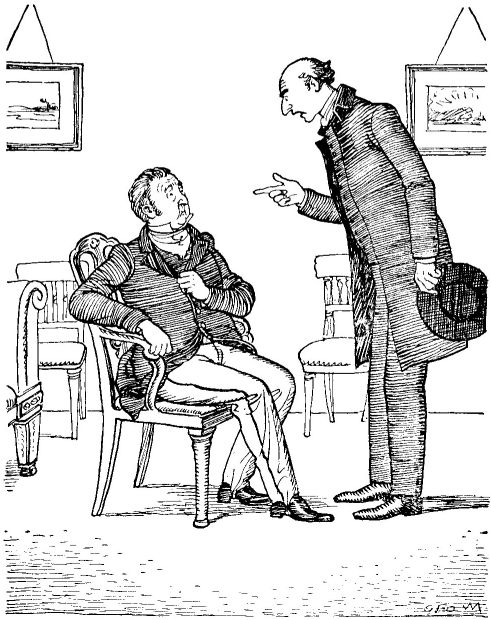
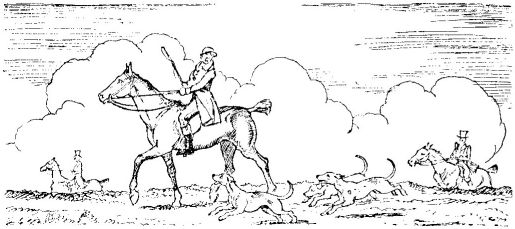
It was Christmas time, and Miss Smith had left Byron Grove to spend a week with her aunt, Mrs. Clott, at the seaside town of X. The young Birdikins were a trifle out of hand in consequence, but their parents felt that the festive season permitted of a certain length of rope in this respect, and themselves joined in the merry play with which the holiday hours were enlivened.
On Boxing Day there was a Lawn Meet of the West M—shire Hounds at Bellacre Castle, and thither the whole family repaired, in order to partake of the hospitality offered to his neighbours by its noble owner, and to witness one of those sportive scenes significant of the pursuits of such denizens of the countryside as were in a position to enjoy them. Mr. and Mrs. Birdikin and their three younger children were driven by Bodger in the family chariot, while Charles, who was for the first time that day to join in the exhilarating chase of the vulpine species, accompanied Thomas Guff on his pony. Both lads were under the care of the Rector's coachman, while, in consideration of Mr. Guff's recent access of prosperity, his daughter, Lucy, had been invited to occupy a seat in the Birdikins' carriage.
Arrived at the entrance to the Earl's mansion, Mr. and Mrs. Birdikin alighted, and, followed by the children, entered the stately precincts, there to be regaled with such refreshment as was fitting for the occasion. Mr. Birdikin was gratified to observe the children instantly seized upon by the Viscount Firebolt, the Honourable John, and the Lady Mary, for he felt that this exhibition of intimacy between his own offspring and that of his host could not but impress those of his neighbours who were witnesses of it. The Earl himself, a handsome and manly figure in his scarlet coat, came forward to greet him, and requested him, in humorous fashion, to take something to keep out the draught. Mr. Birdikin was about to engage him in a serious conversation about the Corn Laws, which were then exercising the minds of landowners, but he turned aside to greet others of his guests, and what was Mr. Birdikin's surprise to see that these were none other than Mr. Clott, the ironmonger, Mrs. Clott, and her niece, Miss Smith.
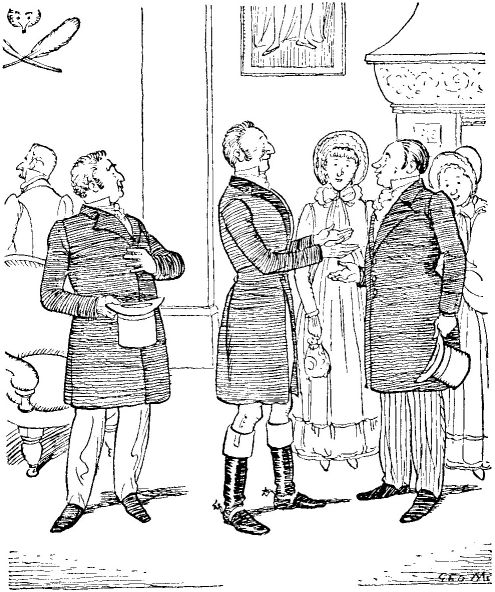
A moment's reflection showed him that a nobleman of the Earl of Bellacre's exalted rank might well receive those of a lower station at a semi-public entertainment of this sort, though he had not imagined that his condescension would have included one who followed the avocation of a retail tradesman. He was about to exhibit his own affability by a word of greeting to Miss Smith, but before he could do so she was set upon by the children, who showed the liveliest pleasure at this meeting with her, those of the Earl and Countess no less than his own and Thomas and Lucy Guff. They took Miss Smith away with them, but left Mr. and Mrs. Clott behind, and the little group was immediately joined by Captain Rouseabout, also in hunting pink, who was greeted by the Earl with a measure of joviality, which Mr. Birdikin put down to his acquirements as a foxhunter rather than to his merits as a man.
He himself held but a low opinion of his neighbour, and was horrified at his digging him playfully in the ribs and inquiring of him with a wink whether he had been singing songs under ladies' windows lately. This reference to a discreditable escapade of his own, in which Mr. Birdikin had been involved, in circumstances that he now wished buried in oblivion, caused him acute annoyance, but he was relieved of the necessity of replying to the ill-timed reminder by the Earl's taking leave of him, with the words, 'Well, I must go and look after somebody else. I see I can safely leave you with your friends, Mr. Birdikin'.
It may be imagined that Mr. Birdikin did not long remain in the company of such supposed 'friends', and he was not a little annoyed at being placed in the same category of guests as Mr. and Mrs. Clott, but judged that the Earl had spoken inadvertently in so identifying him. He sought out Mrs. Birdikin, who had been endeavouring to engage the Countess in conversation, but without success, as that lady was unable to give ear to one among her guests, when so many were desirous of a word with her. She was, however, not a little disturbed in mind by seeing her in sprightly conversation with Miss Smith, and hoped that the governess had not so far forgotten her position of inferiority as to intrude herself upon her; for the children were no longer in the room, and she had not the excuse of their company in presenting herself to the notice of her hostess.
Mr. and Mrs. Birdikin repaired to their chariot, where they could sit in comfort and dignity, and watch what was going forward. It was a scene of which none but our beloved country can offer a parallel. The hounds, attended by the huntsmen and whippers-in, were gathered upon the sward of the park. The gentlemen of the hunt and some few ladies emulative of their prowess were mounting or curbing their high-mettled steeds. Upon the broad stretch of gravel in front of the mansion were gathered various equipages, whose occupants represented all that was most opulent and genteel from the surrounding region.
Not far from Mr. Birdikin's carriage was one of a more resplendent appearance than his own, which in course of years had somewhat deteriorated from its pristine gloss, and harnessed to it were a pair of mettlesome horses whose value was apparent even to his unskilled eye. He was about to inquire of Mrs. Birdikin to what nobleman or gentleman of the vicinity she deemed this spanking equipage to appertain when he saw Mr. and Mrs. Clott and Miss Smith take their places in it. His surprise was so intense that he could not at first give it utterance, but the ownership of the vehicle immediately became apparent when Captain Rouseabout rode up to it and engaged its occupants in hilarious conversation, for he recognized on the box-seat beside the coachman the liveried groom who had been in attendance on his master when he had driven him home from the Hunt Dinner. His lip curled at the idea of his neighbour's thus parading his low tastes in making such people as the Clotts participators in an entertainment that was properly the province of their superiors, and his indignation at the sight of Miss Smith smiling at the coarse buffooneries of Captain Rouseabout, actually within a few yards of where he, to whom she owed respect and allegiance, was sitting, wellnigh overcame him. But the children now came tumbling into the carriage, and as Charles and Thomas Guff came up to it on their ponies, accompanied by all three of the Earl's children, the necessity of harmonious intercourse with the latter prevented him from giving it expression.
Nor could he do so when Captain Rouseabout himself rode up, and, throwing his eye over the horses of which Bodger held the reins, said in a voice that could be heard by all who chose to listen, 'Well, old Birdikin, when are you going to send this cat's meat to the knackers and let me find you a good pair of gee-gees?'
The fear of what he might say next kept Mr. Birdikin from replying except by a sickly smile. Captain Rouseabout's eye then fell upon Fanny, to whom he said, 'Well, little lady, come and have a ride in my new carriage'.
This, however, could not be permitted. The field moved off and the Birdikin family wended their way homewards, with Fanny making loud protestations.
The account of what followed these various encounters must be postponed for another chapter.
Our readers may remember the Reverend Mr. Speedway, who accompanied the Bishop of P——chester on his visit to Byron Grove in the capacity of chaplain. Mr. Birdikin had wellnigh forgotten him, for he had since left his Lordship's employment, and it did not seem likely that their paths would again coincide. What then was his surprise, on his return from the Meet at Bellacre Castle, to be informed that a clergyman was awaiting him, and, on entering the room into which he had been shown, to recognize the not unpleasing features of Mr. Speedway.
The reverend gentleman appeared to be under some stress of emotion. He quickly informed Mr. Birdikin that his patron had recently appointed him to the living of W——, the tithe value of which was nine hundred pounds a year. 'There is also a good rectory house and some fifteen acres of glebe,' said Mr. Speedway, 'and the society in the vicinity is genteel and given to hospitality. I am therefore desirous, Mr. Birdikin, of installing a mistress in W—— Rectory, and I come to you, as the natural guardian of the virtuous and prepossessing Miss Smith, to supplicate your kind offices in laying my proposal before her.'
'And what is your proposal, sir?' inquired Mr. Birdikin. 'Miss Smith is a young woman of respectable though not of distinguished parentage, who has enjoyed the benefits of my protection, and of such measure of my esteem as is fittingly bestowed upon a dependant in my household. I could not sanction her leaving the shelter of my roof to take up her abode under yours except as your wife, and I can scarcely imagine that, with the substantial measure of prosperity to which you have already attained, and the further expectations you may legitimately entertain from your connection with the distinguished prelate with whom I am proud to claim kinship, through Mrs. Birdikin—I scarcely contemplate, I say, that you would wish to hamper your career by joining yourself in wedlock with Miss Smith.'
Mr. Speedway hastened to inform him that such was his project, and inquired whether there was anything against Miss Smith, other than her having filled a position in Mr. Birdikin's household, to render such a marriage unsuitable.
With that quickness of apprehension which marked him, Mr. Birdikin divined that his interlocutor had fallen a victim to one of those excitations of feeling in which the more weighty affairs of life are subordinated to the whims of passion. He did not, however, feel himself called upon to warn Mr. Speedway that he would be doing irretrievable damage to a promising career by marrying a woman who would bring him neither money nor the countenance of well-placed relatives, but judged it sufficient to refer him to Miss Smith's uncle and aunt, Mr. and Mrs. Clott, with whom she was at that time staying. 'Mr. Clott,' he said, 'is a retail ironmonger at X. If you wish to go farther in this matter, you will no doubt find him in his shop, ready to discuss it with you.'
He had thought that Mr. Speedway's resolution would have been weakened by this revelation, but the young clergyman merely thanked him for his information and rushed from the room. A moment afterwards he saw him from his window enter the post-chaise which had been waiting for him and drive furiously away.
It was necessary to inform Mrs. Birdikin of what had happened, for she had recognized her husband's visitor as he had leaped into the post-chaise. She received Mr. Birdikin's account with her usual calm common sense, and remarked that the attentions of Mr. Speedway would relieve Miss Smith of those of Captain Rouseabout, whose designs upon the virtue of the governess must now be apparent to all. 'He will scarcely venture,' she remarked, 'to pursue farther a woman who is affianced to a beneficed clergyman, and I for one shall be glad to see Miss Smith translated to a sphere in which her lowly origin may be forgotten.'
'There are those,' observed Mr. Birdikin, after a pause for reflection, 'who profess more esteem for worldly circumstance than for honest worth, but I have never been one of them, and I shall gladly give my countenance to a marriage which is far beyond what Miss Smith could have looked for, and which she will owe to the chance, supremely happy for her, of having taken service in a family of such distinction as ours. My earnest prayer is that she may never forget it, but by bearing herself with modesty and decorum prove herself worthy of the good fortune that has befallen her.'
Nothing more was heard of Mr. Speedway's suit until Miss Smith returned to Byron Grove a few days later. The Birdikin children welcomed her with the affection which she had succeeded in arousing in their innocent breasts, but bewailed the coming separation which her coming marriage would involve.
'But who told you of my coming marriage?' inquired Miss Smith, with an engaging smile. 'I had thought it would be left for me to give you the first word of it.'
'It was I, Miss Smith,' said Mr. Birdikin, 'who informed your young pupils of the happy lot awaiting you, for, by giving it my countenance, I am in some sort responsible for it. Allow me to offer you my heartfelt congratulations upon your good fortune. It has come at a convenient moment, for with Charles and Henry no longer in need of your tuition we shall the better be able to dispense with the services which your new state in life will preclude you from affording us for much longer.'
'Indeed, sir,' said Miss Smith, 'I have returned only to collect my small possessions and to bid farewell to those from whom I can only regret to part.'
Mr. Birdikin inclined his head. 'In consideration of the respectable marriage you are making, Miss Smith,' he said, 'I will willingly waive the month's notice which is usual in terminating an agreement such as exists between us, and I pray you to accept, as a token of my good will, the month's salary which you would otherwise forfeit. You will no doubt be put to some expense in preparing to ally yourself with a gentleman of a superior station to your own, and I should not wish you to present yourself at the hymeneal altar in "rags".'
The generosity of this offer, though disguised by the whimsicality which was Mr. Birdikin's delicate way of showing that he did not wish to be over-thanked for it, caused Miss Smith some confusion. But Fanny relieved her of the necessity of replying by saying, 'Clara and I will be your bridesmaids', and Miss Smith embraced both little girls and said that she had been about to make that very request of their parents.
Mr. Birdikin felt that the request would better have been made in private, so that, had he not been willing to grant it, the refusal need not have been given in front of the children. The presumption was that Miss Smith's wedding would take place from the house of her aunt, Mrs. Clott, and, in spite of her elevation to a position in which there would be no derogation to his dignity in permitting his children to consort with her, he was not ready to sanction their attending her on so public an occasion before she had dissociated herself from relatives whom, as the wife of a beneficed clergyman, she would no longer wish to recognize.
He returned a non-committal reply, and Charles said, 'When Henry and I come home for our vacations we shall invite Miss Smith to visit us'.
'And you must all visit me,' said Miss Smith. 'I shall be residing at no great distance from Byron Grove and shall see you frequently.'
'I am not aware,' said Mr. Birdikin, 'of the exact locality of Mr. Speedway's parish, but imagine it will be at too great a distance for frequent intercourse.'
Miss Smith gazed at him in surprise. 'May I ask, sir, why Mr. Speedway's name should be mentioned in this connection?' she said.
'Are you not affianced to Mr. Speedway?' asked Mr. Birdikin, with an indulgent smile. 'Your modesty becomes you, Miss Smith, but you need not blench at reference to your future state.'
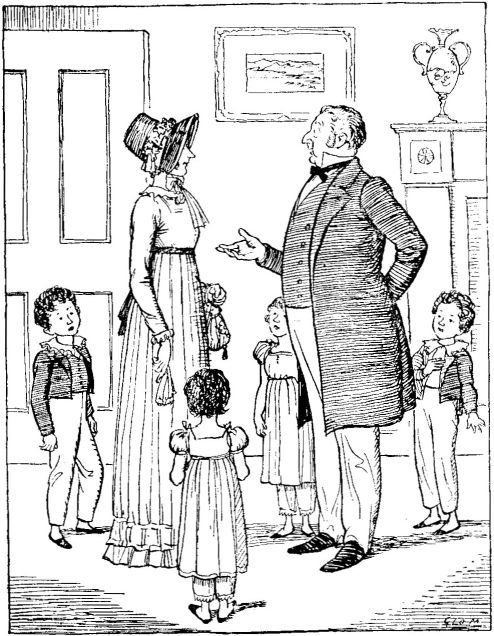
A deep blush suffused Miss Smith's mild, but not unprepossessing countenance. 'You are under a misapprehension, sir,' she said, 'I am affianced to your neighbour, Captain Rouseabout.'
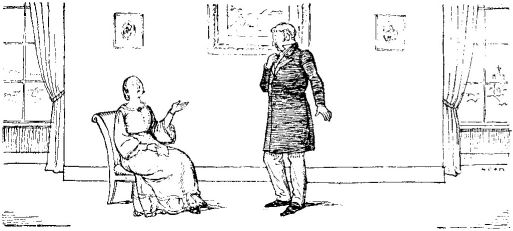
The surprise and dismay of Mr. Birdikin on being apprised of Miss Smith's coming marriage to Captain Rouseabout may better be imagined than described. He had himself seen the Reverend Mr. Speedway drive off to lay his suit at the feet of the governess, but as his cross-examination of Miss Smith elicited the fact that he had not reached his destination, he could only suppose that he had swerved from his purpose when the full force of her unfortunate connection with retail trade had had time to strike him. This, indeed, proved to be the case, for a few days later Mr. Birdikin received a manly letter from the young Rector, in which he said that Miss Smith had made a deep impression upon him, but that in view of his sacred calling he could not bring himself to marry her from a shop, and should now, at whatever temporary inconvenience to himself, erase her image from his mind and seek a bride whom he could present to the more genteel among his parishioners without blushing for her.
These sentiments found ready response in Mr. Birdikin's breast; but at the time Miss Smith's declaration was made to him he was unaware of them, or he would have pointed out to her the contrast between the high-minded decision arrived at by one who took thought of his duty towards others and the self-indulgence of a man who considered only the gratification of his immediate inclinations, at whatever cost to his own dignity and the claims of his neighbours. For Captain Rouseabout, though totally unfitted in Mr. Birdikin's estimation for the position he filled, was possessed of a fine estate and, had he not been so lost to all sense of what was becoming to a gentleman of property, he must have thought twice before affronting his neighbours by presenting to them a bride who had not only filled a subordinate position in Mr. Birdikin's household, but had relatives living within a stone's throw of whom it was impossible to conceive even a Captain Rouseabout being anything but heartily ashamed when the first impulsion of his passion had spent itself.
He did venture to point out to Miss Smith the grave risk she was running in allying herself to a man of Captain Rouseabout's notorious character, who might be expected to throw her aside like an old glove when he had had, as it were, enough of her. He told her that, although he and Mrs. Birdikin would not refuse to consort with her after her marriage, if she persisted in the unbridled course on which she had set out, they could not in any way countenance it beforehand, or accept invitations, either for themselves or their children, to a wedding which he supposed would take place from the abode of her aunt, Mrs. Clott.
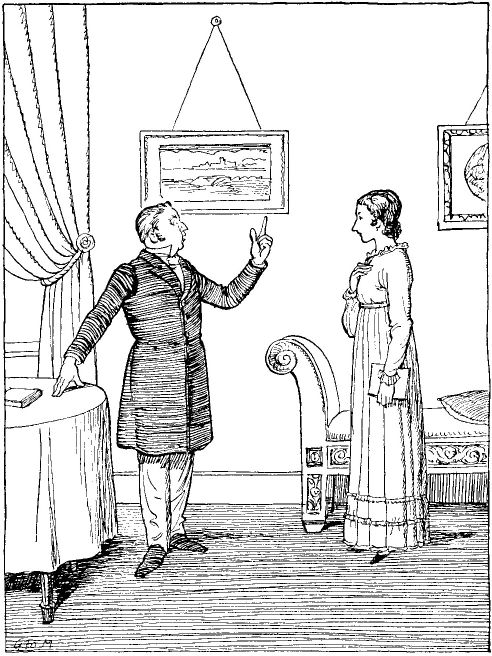
'You are mistaken, sir, in your estimation of Captain Rouseabout,' said Miss Smith, 'and you will remember that it was yourself who encouraged him to the somewhat unseemly declaration of his admiration for myself which I have since forgiven him. With regard to the marriage ceremony, I have felt that it would not be entirely fitting that it should take place from the house of my aunt, though Captain Rouseabout himself has so high an appreciation of her that he vows, in the language of symbolism, that she is the pick of the stable. I have thought it possible that, in view of the position of dignity to which I am shortly to be elevated, an offer might be made to me to proceed to the altar from the house of those who are closer in rank to Captain Rouseabout than my kind aunt and uncle can claim to be.'
Mr. Birdikin did not at the time take this as a suggestion that Miss Smith should be married from Byron Grove. He was concerned lest the episode, already recounted in these pages, to which Miss Smith had made reference, should come to the ears of Mrs. Birdikin, and he was anxious that the governess should leave Byron Grove without his children, especially Fanny, divining that there was matter of grave disconcern in his attitude towards her. He therefore dismissed Miss Smith from his presence, with a cheque for her last month's salary and a statement that as she had made her bed so must she lie upon it, and within a few hours she had left the shelter of Byron Grove for ever.
In conversation with his wife, however, Mr. Birdikin recalled Miss Smith's words, and their true significance flashed upon him. 'What!' he exclaimed. 'After all that she has received at our hands, for which she has repaid us with the basest ingratitude, to expect us to go out of our way, and to spend money upon concealing her lowly origin, in order that she may ally herself to that oaf, that roué, that scoffer against all propriety and decorum! It is too much. She has already been corrupted by her association with him, and is no longer the modest, respectful woman whom I have harboured for so long under my roof. I wash my hands of her from henceforth.'
'I would remind you, Mr. Birdikin,' said his lady, 'that as the wife of the owner of Beechcroft Miss Smith will enjoy a measure of consideration that cannot be conveniently overlooked. She will be mistress of a finer house than this and drive about in a chariot beside which mine presents no better appearance than that of a hackney-coach. I have no mind to emphasize the discrepancy between Miss Smith's state and my own, and beg that you will not draw attention to it by taking up an attitude which will only bring upon you the derision of those with whom you wish to stand well.'
Mr. Birdikin saw the force of this contention, and, in view of Miss Smith's future state as a lady of quality, began to regret that he had already erected a barrier to an intimacy which he now saw to be desirable. After further parley with Mrs. Birdikin he wrote to Miss Smith and generously offered to have the wedding at Byron Grove, adding that he should be pleased to permit his daughters to attend her to the altar as bridesmaids.
The delight of Clara and Fanny when this news was imparted to them knew no bounds, and Mr. Birdikin felt that he had dealt with an awkward situation in a manner that could only increase his credit. What then was his surprise when he received a letter from Miss Smith, thanking him for his offer but informing him that the Countess of Bellacre had graciously invited her to be married from Bellacre Castle, and that the nuptial knot would be tied by the Lord Bishop of P——chester, who had been a close personal friend of Captain Rouseabout's late father, and had expressed a gratifying approval of his choice of bride. She added that it would give her great pleasure to have Clara and Fanny as her bridesmaids, in addition to the Lady Mary Firebolt and the Honourable Miss Martingale, a young niece of Captain Rouseabout's.
'Well,' said Mrs. Birdikin, on reception of the contents of this missive, 'I apprehend, Mr. Birdikin, that you will not now refuse your countenance to Miss Smith's nuptials, which I presume Mr. and Mrs. Clott will also be invited to witness. If I add that your Aunt Maria will likewise expect an invitation, it is with the object of reminding you that while my relatives include a Bishop, and, at a remove of some distance, a Baronet, your own scarcely warrant the attitude you have taken up to the future Mrs. Captain Rouseabout, and I trust that from henceforth you will drop it.'
Our last glimpse of the family whose history we have been following through weal and through woe shall be on the occasion of a dinner party given to Captain and Mrs. Rouseabout on their return from their honeymoon. The four children were permitted to appear at this reunion, in consideration of Mrs. Rouseabout's having before her marriage filled the position of governess to them, but Mr. Birdikin warned them that they were on no account to refer to that fact in conversation with her.
'Mrs. Rouseabout is now a lady of Quality,' he said, 'and is shortly to be presented to her Sovereign. It will no doubt be distasteful to her to be reminded that at no distant time she was employed in a comparatively menial capacity in the house to which she will return as an honoured guest. It is in the observance due to rank and station that true breeding shows itself, and I would have my children bear themselves towards those in a superior position in society with the nice consideration that is also due to themselves as the sons and daughters of a gentleman of property.'
'Hoity-toity!' ejaculated Mr. Birdikin's Aunt Maria, who was at that time sojourning under his hospitable roof. 'Stuffing their heads with a pack of nonsense! If Mrs. Rouseabout is the sensible woman she always was, she don't want to forget that she earned her living like some of the best of us.'
And so it proved to be. Mrs. Rouseabout showed herself unfeignedly pleased to meet once more the children whom she had once taught, and by recalling to their minds numerous episodes of the past showed that she had no wish to forget the position she had held as their paid instructress. This could not but be pleasing to Mr. Birdikin. He himself took part in the sprightly conversation, and recalled to Mrs. Rouseabout's recollection an occasion upon which he had been suffering from an attack of gout and she had inadvertently jarred his bandaged foot through tripping over the cat while carrying a shovelful of coals with which he had requested her to replenish his fire. 'Had it not been for the strong curb I am accustomed to place upon my irritation,' he said, 'you would have been dismissed from my service then and there, and the virtuous but submissive Miss Smith would not have blossomed into the elegant and stylish Mrs. Rouseabout.'
There was something about this speech that was not pleasing to Mrs. Purport who, addressing herself to Mrs. Rouseabout, inquired, 'How is your aunt, Mrs. Clott? I suppose you haven't threw her over since you become so grand?'
The question was answered by Captain Rouseabout, who said, 'We don't throw over our old favourites when they can't work up to the collar. We put 'em out to grass'.
The interpretation of this somewhat cryptic saying was that upon their niece's marriage Mr. and Mrs. Clott had been persuaded to relinquish the oversight of their hardware business, in which they had amassed a not inconsiderable fortune, and were about to settle themselves in a genteel and commodious cottage upon Captain Rouseabout's estate.
When this news had been given in detail Fanny clapped her hands and said, 'I shall be able to visit Mrs. Clott every day'.
'So shall we all,' replied Charles, 'when Henry and I are at home on vacation from school. But I shall regret that Mr. and Mrs. Clott are not still resident at the seaside, so that we can enjoy the pleasure of immersion in the ocean when we visit them.'
'My Papa would not permit us to visit Mrs. Clott when she lived over her shop,' said Henry, 'but I opine that the embargo will be lifted, now that Mr. and Mrs. Clott have rid themselves of the taint of retail trade.'
'Lor! What stuff you do put into the heads of them innocents, Zephaniah Birdikin!' exclaimed Aunt Maria. 'Let me remind you that Mr. Clott is own mother's cousin's son to my dear husband, who made his money in the leather dressing, and——'
'What!' interrupted Captain Rouseabout. 'Was old Half-crown Purport your husband, ma'am? The best saddler in the kingdom, and a good sporty cove too. Never missed a race-meeting and never had more than half a crown on each way. Let me drink a glass of wine with you, ma'am. I'm proud to know you.'
Aunt Maria was gratified by this address from one who, in spite of his predilection for sports and the company attached to them which Mr. Birdikin held in abhorrence, she recognized as belonging by birth and station to the higher ranks of society. 'My Purport was in with all the nobs, but never presumed on it,' she said, with a glance at her nephew, 'and if there's some who don't like the smell of his money there's others who won't be so particular where it comes from when I join him under his marble monument.'
Mr. Birdikin was aghast at what he could only regard as a threat of Mrs. Purport's leaving her money away from him, and rebuked Henry in no measured terms for the unfortunate remark which had led to it. 'I am ashamed,' he said, 'that a son of mine should express thoughts so subversive of all the principles in which I have sought to train my children. How often have I told you, sir, that honest worth counts far more in the sight of Heaven than the trappings of gentility? I would rather take in mine the hand of an upright grocer, nay even that of a tiller of the soil who has learned to bear himself respectfully towards his betters, than be regaled with the choicest viands by a man of rank whose character I could not respect.'
In his indignation he would have bidden Henry to leave the table, but his attention was withdrawn from him by Aunt Maria, before whom the butler had set a plateful of venison in a somewhat advanced state of decomposition. 'I can't abide this rotten meat,' she said. 'It fair turns my stomach.'
She was accommodated with a helping of roast beef in the place of the offending dish, and the rest of the dinner passed without further occasion for Mr. Birdikin to exercise his parental authority.
When the two gentlemen were left together over their wine, Captain Rouseabout surprised his host by the moderation he showed in its consumption. 'It does not become a married man,' he said, 'to sit swilling his liquor, when he could be enjoying the society of the mares and the fillies. I have observed in you, Birdikin, a tendency towards the bottle which I can only deplore in a man who has had before him the example of a pure and innocent woman who would grace the highest stable in the land.'
'If you are alluding to my wife, sir——' began Mr. Birdikin.
'No, sir, I am alluding to mine,' Captain Rouseabout interrupted him. 'There is a woman, sir, whose gentle influence could charm away the worst spavin ever seen, or induce a welcher to pay up and go home to his wife and children. Let me implore you, Birdikin, for the sake of your wife and children, to run between the posts, so that when the time comes for you to weigh in you will not show up with more in your saddle-cloth than you can carry. Now I have had my whack, and you have had as much as is good for you. Put in the cork and let us adjourn to the paddock.'
Though inclined to take offence at Captain Rouseabout's unmerited strictures upon himself, Mr. Birdikin was sensible that the amelioration in his own habits brought about by his marriage would render neighbourly intercourse with him easier to support. They adjourned to the parlour, and the rest of the evening, until the children were sent to bed, was occupied by an innocent game with cards and counters, Captain Rouseabout being taken away by his wife at ten o'clock, and refusing even the modest 'night-cap' proposed to him by Mr. Birdikin.
On the morrow Charles and Henry departed for Dr. Thwackem's Select Academy for Young Gentlemen at Clapham, and the period of their childhood which we have sought to illuminate was over.
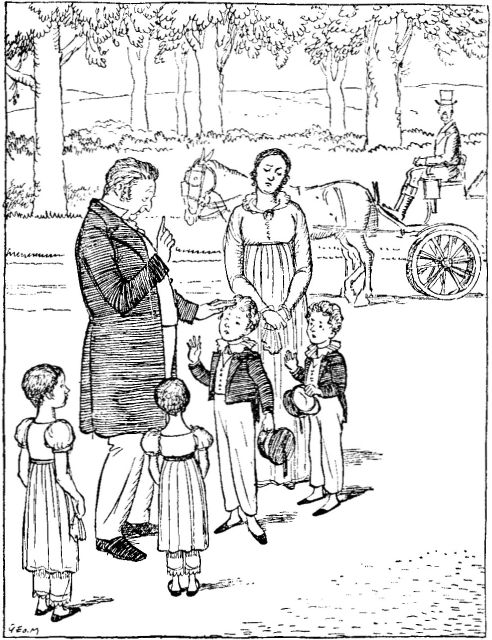
We leave Mr. Birdikin, in spite of occasional damage to his self-esteem, conscious of a rectitude and a worldly position superior to the ordinary, and on the look-out for a governess, to continue the scholastic education of Clara and Fanny, who should possess all the excellent qualities of a Miss Smith, and be ready to exercise them on a lower scale of emolument. For their moral upbringing he relied upon his own precept and example, as before.
[The end of The Birdikin Family by Archibald Marshall]